#also the capital one commercials
Explore tagged Tumblr posts
Text
every time the commentators say jennifer gardiner’s name my mind automatically pictures jenna rink
3 notes
·
View notes
Text
i have, ofc, been doing my due stand-up diligence and writing joke premises down for the last year. and yet for some reason, instead of polishing any of that for class tonight, i am writing some new material about the presidential debate, liberal vs. conservative what-about-ism, and trans genocide 🙃
something about seeing alok v menon last night has me feeling SPICY
#can't believe it's been over a year since i first did stand-up... smh#improv really took over lmao#to be fair the transphobia one is def an old premise i've been working on for months...#the class is full of cis ppl tho so i'm not weighing their reaction too heavily lol#i'm trying to do an open mic soon at this cafe that also hosts drag shows -- *that's* a reaction i'll pay mind to 😂😅#i mean i guess my typical stuff is never ever lighthearted anyway lmao#my first set was entirely about breast cancer lol#and my premises are mostly about xenophobia transphobia and commercial capitalism 😆#i'm trying to tell the jokes that'll piss people off#cause they're about the topics that i have the MOST experience in and the MOST to say about 😂#just thoughts
2 notes
·
View notes
Text
i have many thoughts in general but this tidbit from tingyun's voice lines is one of the things i wanna elaborate some more on at some point...
" Every time I head out, I leave a letter behind and lock it in the drawers of my shop. If I come back, then I'll burn it later. If I don't... then it'll be something for others to remember me by."
#OOC.#this post is more of a reminder to myself before i go try to write some stuff for nat and/or stelle#but idk i like her concept of being pacifistic despite the inherent dangers of her position as... basically a galactic ambassador?#it says that most reps take weapons with them but she refuses to because she believes that you should build relationships from a foundation#of peace instead of threat of violence#which has worked in her favor but idk its kinda sombering knowing that she basically leaves her last words in a letter every time sh#e leaves for another planet to do her job because she knows shes leaving herself vulnerable if somebody wanted to do something to hurt her#and she burns it every time she comes back only to rewrite it again months later when she goes on her next trip#xi.anzhou's lore is ROUGH dont get me wrong but theres a lot of fun concepts in there that im smashing together LMAO#also her traveling the way she does opens up so much room to meet literally anybody#its just jarilo-vi right now but as more worlds open up it just gives her more room to work with#also the fact that it opens up a lot of possiblities for world building for her to come to these planets because she's there ON business an#trade & commerce is one of the BIGGEST things a society needs. one decision could steer the entire direction of their society in a complete#y different direction#like even just introducing more leisurely/hobby focused products can be a huge turning point for a war stricken world#or better materials for their tech and their buildings#new crops in exchange for what they have#literally the exchange we see in her lore is her discussing taking just a few samples of a world's plants and growing it on xianzhou for#commercial sale AND that world would recieve shipments of said crops along with wahtever other deals they struck#and blablabla yes i know capitalism whatever. tis the way of the world and i think its really interesting frmo a worldbuilding standpoint#tingyuns a very interesting character because she can change a lot of things in very little time in the big picture#i feel like she's commonly brushed off as a shallow character who doesnt do much but she's one of the most accomplished characters in xian#zhou EASILY#yes you could argue that jing yuan is more because of his general shit or yukong is the helm master blablabla like Yes they are also very#accomplished but she is the literal only reason that the grand fairs are FAMOUS throughout the galaxy. they werent until she took leadershi#she's completed trade missions to SIXTEEN different panets and is implied to have formed alliances with at least a few of them#and was the one to renew xianzhou's mutual alliance with the IPC#i dunno#also i think people see her as way more of a trickster than she is#like ... i thought she was too but she really isn't particularly mischevious? girls tried to leave MULTIPLE times during the story bc she
4 notes
·
View notes
Note
Wasn't it the beauty product nfb that the actress apparently died during and then the company goes.... Welp, that's too bad let's show it anyway! According to the credits at least.
literally, miss canterbury-boatshoe was selling gastric acid as a hair and skincare product and then she died because beauty hurts and then they kept using her lifeless body to market even more beauty products because capitalism and the feminine beauty industry.
the nfb devs really left no modern evil unspoofed lmao.
#LOVE the eob commercials i love the one from the lockdown where it's like#eob: cause youre gonna leave your house eventually#AND ALSO 'YOURE STILL AGEING' FKFJDJDJD#i love the ads i love the companies they really went in on capitalism there#thats why i love sophia and her ridiculous elon musk tendencies lmao#juli answers#nfb asks
3 notes
·
View notes
Text
Even that is still valuable. If people make it easier for researchers at big ag companies to find and promote a wider diversity of food crops that still helps towards food security, and it doesn't stop the public and NGOs etc. from accessing and propagating the information to use either.
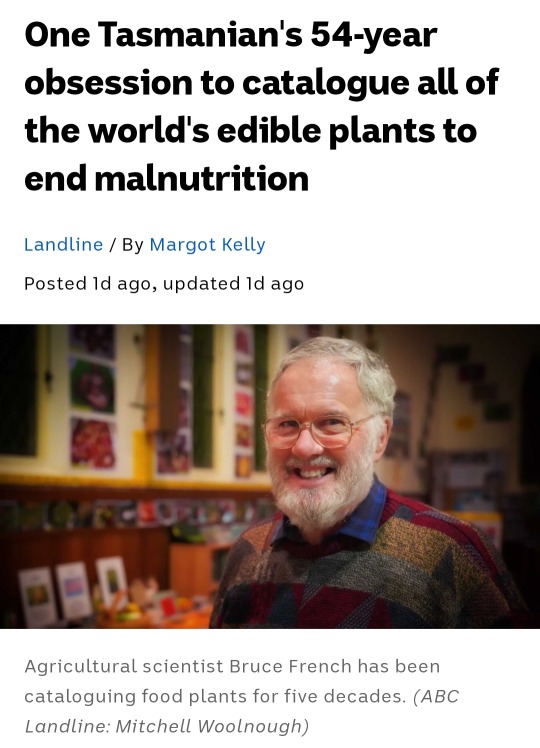
https://www.abc.net.au/news/2020-08-22/food-plant-solutions-malnutrition-farming-edible-plants/12580732
https://fms.cmsvr.com/fmi/webd/Food_Plants_World
This guy is my new hero. I LOVE learning about native food plants that just grow everywhere without human help.
The database is a little clunky to use (especially on a phone), but still loads of excellent information.
#plants#listen crop diversity is a great way of fighting malnutrition and ensuring food security#but farmers as well aren't equipped to start sorting through hundreds of genotypes of wild plants to find ones that work with cultivation#if big companies get hold of this information it actually would benefit people still#because they have the power and resources to find improve market and distribute novel crops#truth is big agricultural companies may be evil because y'know corporations and capitalism#but they've also been instrumental in uh helping ensure people are staying fed#and say monsanto developing a commercial strain of random berry number five#doesn't stop subsistence farmers or whatever growing it to supplement their harvest#it just means that there may be better yielding varieties out there too
85K notes
·
View notes
Text
In before I start seeing people bitching about rainbow capitalism MY favorite rainbow capitalism story is about Subaru. Yes the Japanese car company.
In the nineties, they were struggling. They were competing with a dozen other companies targeting the main demographic at the time: white men ages 18-35, especially after a failed luxury car launch with a new ad agency. “What we need is to focus on niche demographics,” they decided, and then focused on people who enjoyed the outdoors. The Subaru was excellent at driving on dirt roads that many other vehicles couldn’t at the time, so it was perfect for all those off-road campers; they started making all-wheel drive standard in all their cars to help with that. And the people who wanted cars to go do outdoor stuff? Lesbians.
Okay. Of course it wasn’t only lesbians buying Subarus. They’re on the list with educators, health-care professionals, and IT people. But the point is, this Japanese car company interviewed this strange demographic (single, female head of household) and realized one important factor: They were lesbians. They liked to be able to use the cars to go do outdoorsy stuff, and they liked that they could use the cars to haul stuff rather than a big truck or van. Subaru had a choice to make then. They had four other demographics they could market to, after all--the educators, the health-care professionals, IT professionals, and straight outdoorsy couples. Their company didn’t hinge on this one “problematic” demographic.
And they decided “fuck it,” and marketed to lesbians anyway. This included offering benefits to American gay and lesbian employees for their domestic partners, so it didn’t look like a cash grab. (This was not a problem. They already offered those in Canada.)
Yes, there was some backlash. They got letters from a grassroots group accusing them of promoting homosexuality, and every letter said they’d no longer be buying from Subaru. “You didn’t buy from us before, either,” Subaru realized, and ignored them. It helped that the team really cared about the plan, and that they had many straight allies to back them up. There was also some initial backlash when Subaru hired women to play a lesbian couple in the commercial, but they quickly found that lesbians preferred more subtlety; “XENA LVR” on a license plate, or bumper stickers with the names of popular LGBTQ+ destinations, or taglines of “Get out. Stay out.” that could be used for the outdoors--or the closet.
Subaru said “We see you. We support you.” They sponsored Pride parades and partnered with Rainbow Card and hired Martina Navratilova as spokeswoman. They put their money where their mouth is and went into it whole hog. In a time where companies did not want to take our money, Subaru said, “Why not? They’re people who drive.” And that was groundbreaking.
52K notes
·
View notes
Text
Green energy is in its heyday.
Renewable energy sources now account for 22% of the nation’s electricity, and solar has skyrocketed eight times over in the last decade. This spring in California, wind, water, and solar power energy sources exceeded expectations, accounting for an average of 61.5 percent of the state's electricity demand across 52 days.
But green energy has a lithium problem. Lithium batteries control more than 90% of the global grid battery storage market.
That’s not just cell phones, laptops, electric toothbrushes, and tools. Scooters, e-bikes, hybrids, and electric vehicles all rely on rechargeable lithium batteries to get going.
Fortunately, this past week, Natron Energy launched its first-ever commercial-scale production of sodium-ion batteries in the U.S.
“Sodium-ion batteries offer a unique alternative to lithium-ion, with higher power, faster recharge, longer lifecycle and a completely safe and stable chemistry,” said Colin Wessells — Natron Founder and Co-CEO — at the kick-off event in Michigan.
The new sodium-ion batteries charge and discharge at rates 10 times faster than lithium-ion, with an estimated lifespan of 50,000 cycles.
Wessells said that using sodium as a primary mineral alternative eliminates industry-wide issues of worker negligence, geopolitical disruption, and the “questionable environmental impacts” inextricably linked to lithium mining.
“The electrification of our economy is dependent on the development and production of new, innovative energy storage solutions,” Wessells said.
Why are sodium batteries a better alternative to lithium?
The birth and death cycle of lithium is shadowed in environmental destruction. The process of extracting lithium pollutes the water, air, and soil, and when it’s eventually discarded, the flammable batteries are prone to bursting into flames and burning out in landfills.
There’s also a human cost. Lithium-ion materials like cobalt and nickel are not only harder to source and procure, but their supply chains are also overwhelmingly attributed to hazardous working conditions and child labor law violations.
Sodium, on the other hand, is estimated to be 1,000 times more abundant in the earth’s crust than lithium.
“Unlike lithium, sodium can be produced from an abundant material: salt,” engineer Casey Crownhart wrote in the MIT Technology Review. “Because the raw ingredients are cheap and widely available, there’s potential for sodium-ion batteries to be significantly less expensive than their lithium-ion counterparts if more companies start making more of them.”
What will these batteries be used for?
Right now, Natron has its focus set on AI models and data storage centers, which consume hefty amounts of energy. In 2023, the MIT Technology Review reported that one AI model can emit more than 626,00 pounds of carbon dioxide equivalent.
“We expect our battery solutions will be used to power the explosive growth in data centers used for Artificial Intelligence,” said Wendell Brooks, co-CEO of Natron.
“With the start of commercial-scale production here in Michigan, we are well-positioned to capitalize on the growing demand for efficient, safe, and reliable battery energy storage.”
The fast-charging energy alternative also has limitless potential on a consumer level, and Natron is eying telecommunications and EV fast-charging once it begins servicing AI data storage centers in June.
On a larger scale, sodium-ion batteries could radically change the manufacturing and production sectors — from housing energy to lower electricity costs in warehouses, to charging backup stations and powering electric vehicles, trucks, forklifts, and so on.
“I founded Natron because we saw climate change as the defining problem of our time,” Wessells said. “We believe batteries have a role to play.”
-via GoodGoodGood, May 3, 2024
--
Note: I wanted to make sure this was legit (scientifically and in general), and I'm happy to report that it really is! x, x, x, x
#batteries#lithium#lithium ion batteries#lithium battery#sodium#clean energy#energy storage#electrochemistry#lithium mining#pollution#human rights#displacement#forced labor#child labor#mining#good news#hope
3K notes
·
View notes
Text
Your car spies on you and rats you out to insurance companies

I'm on tour with my new, nationally bestselling novel The Bezzle! Catch me TOMORROW (Mar 13) in SAN FRANCISCO with ROBIN SLOAN, then Toronto, NYC, Anaheim, and more!

Another characteristically brilliant Kashmir Hill story for The New York Times reveals another characteristically terrible fact about modern life: your car secretly records fine-grained telemetry about your driving and sells it to data-brokers, who sell it to insurers, who use it as a pretext to gouge you on premiums:
https://www.nytimes.com/2024/03/11/technology/carmakers-driver-tracking-insurance.html
Almost every car manufacturer does this: Hyundai, Nissan, Ford, Chrysler, etc etc:
https://www.repairerdrivennews.com/2020/09/09/ford-state-farm-ford-metromile-honda-verisk-among-insurer-oem-telematics-connections/
This is true whether you own or lease the car, and it's separate from the "black box" your insurer might have offered to you in exchange for a discount on your premiums. In other words, even if you say no to the insurer's carrot – a surveillance-based discount – they've got a stick in reserve: buying your nonconsensually harvested data on the open market.
I've always hated that saying, "If you're not paying for the product, you're the product," the reason being that it posits decent treatment as a customer reward program, like the little ramekin warm nuts first class passengers get before takeoff. Companies don't treat you well when you pay them. Companies treat you well when they fear the consequences of treating you badly.
Take Apple. The company offers Ios users a one-tap opt-out from commercial surveillance, and more than 96% of users opted out. Presumably, the other 4% were either confused or on Facebook's payroll. Apple – and its army of cultists – insist that this proves that our world's woes can be traced to cheapskate "consumers" who expected to get something for nothing by using advertising-supported products.
But here's the kicker: right after Apple blocked all its rivals from spying on its customers, it began secretly spying on those customers! Apple has a rival surveillance ad network, and even if you opt out of commercial surveillance on your Iphone, Apple still secretly spies on you and uses the data to target you for ads:
https://pluralistic.net/2022/11/14/luxury-surveillance/#liar-liar
Even if you're paying for the product, you're still the product – provided the company can get away with treating you as the product. Apple can absolutely get away with treating you as the product, because it lacks the historical constraints that prevented Apple – and other companies – from treating you as the product.
As I described in my McLuhan lecture on enshittification, tech firms can be constrained by four forces:
I. Competition
II. Regulation
III. Self-help
IV. Labor
https://pluralistic.net/2024/01/30/go-nuts-meine-kerle/#ich-bin-ein-bratapfel
When companies have real competitors – when a sector is composed of dozens or hundreds of roughly evenly matched firms – they have to worry that a maltreated customer might move to a rival. 40 years of antitrust neglect means that corporations were able to buy their way to dominance with predatory mergers and pricing, producing today's inbred, Habsburg capitalism. Apple and Google are a mobile duopoly, Google is a search monopoly, etc. It's not just tech! Every sector looks like this:
https://www.openmarketsinstitute.org/learn/monopoly-by-the-numbers
Eliminating competition doesn't just deprive customers of alternatives, it also empowers corporations. Liberated from "wasteful competition," companies in concentrated industries can extract massive profits. Think of how both Apple and Google have "competitively" arrived at the same 30% app tax on app sales and transactions, a rate that's more than 1,000% higher than the transaction fees extracted by the (bloated, price-gouging) credit-card sector:
https://pluralistic.net/2023/06/07/curatorial-vig/#app-tax
But cartels' power goes beyond the size of their warchest. The real source of a cartel's power is the ease with which a small number of companies can arrive at – and stick to – a common lobbying position. That's where "regulatory capture" comes in: the mobile duopoly has an easier time of capturing its regulators because two companies have an easy time agreeing on how to spend their app-tax billions:
https://pluralistic.net/2022/06/05/regulatory-capture/
Apple – and Google, and Facebook, and your car company – can violate your privacy because they aren't constrained regulation, just as Uber can violate its drivers' labor rights and Amazon can violate your consumer rights. The tech cartels have captured their regulators and convinced them that the law doesn't apply if it's being broken via an app:
https://pluralistic.net/2023/04/18/cursed-are-the-sausagemakers/#how-the-parties-get-to-yes
In other words, Apple can spy on you because it's allowed to spy on you. America's last consumer privacy law was passed in 1988, and it bans video-store clerks from leaking your VHS rental history. Congress has taken no action on consumer privacy since the Reagan years:
https://www.eff.org/tags/video-privacy-protection-act
But tech has some special enshittification-resistant characteristics. The most important of these is interoperability: the fact that computers are universal digital machines that can run any program. HP can design a printer that rejects third-party ink and charge $10,000/gallon for its own colored water, but someone else can write a program that lets you jailbreak your printer so that it accepts any ink cartridge:
https://www.eff.org/deeplinks/2020/11/ink-stained-wretches-battle-soul-digital-freedom-taking-place-inside-your-printer
Tech companies that contemplated enshittifying their products always had to watch over their shoulders for a rival that might offer a disenshittification tool and use that as a wedge between the company and its customers. If you make your website's ads 20% more obnoxious in anticipation of a 2% increase in gross margins, you have to consider the possibility that 40% of your users will google "how do I block ads?" Because the revenue from a user who blocks ads doesn't stay at 100% of the current levels – it drops to zero, forever (no user ever googles "how do I stop blocking ads?").
The majority of web users are running an ad-blocker:
https://doc.searls.com/2023/11/11/how-is-the-worlds-biggest-boycott-doing/
Web operators made them an offer ("free website in exchange for unlimited surveillance and unfettered intrusions") and they made a counteroffer ("how about 'nah'?"):
https://www.eff.org/deeplinks/2019/07/adblocking-how-about-nah
Here's the thing: reverse-engineering an app – or any other IP-encumbered technology – is a legal minefield. Just decompiling an app exposes you to felony prosecution: a five year sentence and a $500k fine for violating Section 1201 of the DMCA. But it's not just the DMCA – modern products are surrounded with high-tech tripwires that allow companies to invoke IP law to prevent competitors from augmenting, recongifuring or adapting their products. When a business says it has "IP," it means that it has arranged its legal affairs to allow it to invoke the power of the state to control its customers, critics and competitors:
https://locusmag.com/2020/09/cory-doctorow-ip/
An "app" is just a web-page skinned in enough IP to make it a crime to add an ad-blocker to it. This is what Jay Freeman calls "felony contempt of business model" and it's everywhere. When companies don't have to worry about users deploying self-help measures to disenshittify their products, they are freed from the constraint that prevents them indulging the impulse to shift value from their customers to themselves.
Apple owes its existence to interoperability – its ability to clone Microsoft Office's file formats for Pages, Numbers and Keynote, which saved the company in the early 2000s – and ever since, it has devoted its existence to making sure no one ever does to Apple what Apple did to Microsoft:
https://www.eff.org/deeplinks/2019/06/adversarial-interoperability-reviving-elegant-weapon-more-civilized-age-slay
Regulatory capture cuts both ways: it's not just about powerful corporations being free to flout the law, it's also about their ability to enlist the law to punish competitors that might constrain their plans for exploiting their workers, customers, suppliers or other stakeholders.
The final historical constraint on tech companies was their own workers. Tech has very low union-density, but that's in part because individual tech workers enjoyed so much bargaining power due to their scarcity. This is why their bosses pampered them with whimsical campuses filled with gourmet cafeterias, fancy gyms and free massages: it allowed tech companies to convince tech workers to work like government mules by flattering them that they were partners on a mission to bring the world to its digital future:
https://pluralistic.net/2023/09/10/the-proletarianization-of-tech-workers/
For tech bosses, this gambit worked well, but failed badly. On the one hand, they were able to get otherwise powerful workers to consent to being "extremely hardcore" by invoking Fobazi Ettarh's spirit of "vocational awe":
https://www.inthelibrarywiththeleadpipe.org/2018/vocational-awe/
On the other hand, when you motivate your workers by appealing to their sense of mission, the downside is that they feel a sense of mission. That means that when you demand that a tech worker enshittifies something they missed their mother's funeral to deliver, they will experience a profound sense of moral injury and refuse, and that worker's bargaining power means that they can make it stick.
Or at least, it did. In this era of mass tech layoffs, when Google can fire 12,000 workers after a $80b stock buyback that would have paid their wages for the next 27 years, tech workers are learning that the answer to "I won't do this and you can't make me" is "don't let the door hit you in the ass on the way out" (AKA "sharpen your blades boys"):
https://techcrunch.com/2022/09/29/elon-musk-texts-discovery-twitter/
With competition, regulation, self-help and labor cleared away, tech firms – and firms that have wrapped their products around the pluripotently malleable core of digital tech, including automotive makers – are no longer constrained from enshittifying their products.
And that's why your car manufacturer has chosen to spy on you and sell your private information to data-brokers and anyone else who wants it. Not because you didn't pay for the product, so you're the product. It's because they can get away with it.
Cars are enshittified. The dozens of chips that auto makers have shoveled into their car design are only incidentally related to delivering a better product. The primary use for those chips is autoenshittification – access to legal strictures ("IP") that allows them to block modifications and repairs that would interfere with the unfettered abuse of their own customers:
https://pluralistic.net/2023/07/24/rent-to-pwn/#kitt-is-a-demon
The fact that it's a felony to reverse-engineer and modify a car's software opens the floodgates to all kinds of shitty scams. Remember when Bay Staters were voting on a ballot measure to impose right-to-repair obligations on automakers in Massachusetts? The only reason they needed to have the law intervene to make right-to-repair viable is that Big Car has figured out that if it encrypts its diagnostic messages, it can felonize third-party diagnosis of a car, because decrypting the messages violates the DMCA:
https://www.eff.org/deeplinks/2013/11/drm-cars-will-drive-consumers-crazy
Big Car figured out that VIN locking – DRM for engine components and subassemblies – can felonize the production and the installation of third-party spare parts:
https://pluralistic.net/2022/05/08/about-those-kill-switched-ukrainian-tractors/
The fact that you can't legally modify your car means that automakers can go back to their pre-2008 ways, when they transformed themselves into unregulated banks that incidentally manufactured the cars they sold subprime loans for. Subprime auto loans – over $1t worth! – absolutely relies on the fact that borrowers' cars can be remotely controlled by lenders. Miss a payment and your car's stereo turns itself on and blares threatening messages at top volume, which you can't turn off. Break the lease agreement that says you won't drive your car over the county line and it will immobilize itself. Try to change any of this software and you'll commit a felony under Section 1201 of the DMCA:
https://pluralistic.net/2021/04/02/innovation-unlocks-markets/#digital-arm-breakers
Tesla, naturally, has the most advanced anti-features. Long before BMW tried to rent you your seat-heater and Mercedes tried to sell you a monthly subscription to your accelerator pedal, Teslas were demon-haunted nightmare cars. Miss a Tesla payment and the car will immobilize itself and lock you out until the repo man arrives, then it will blare its horn and back itself out of its parking spot. If you "buy" the right to fully charge your car's battery or use the features it came with, you don't own them – they're repossessed when your car changes hands, meaning you get less money on the used market because your car's next owner has to buy these features all over again:
https://pluralistic.net/2023/07/28/edison-not-tesla/#demon-haunted-world
And all this DRM allows your car maker to install spyware that you're not allowed to remove. They really tipped their hand on this when the R2R ballot measure was steaming towards an 80% victory, with wall-to-wall scare ads that revealed that your car collects so much information about you that allowing third parties to access it could lead to your murder (no, really!):
https://pluralistic.net/2020/09/03/rip-david-graeber/#rolling-surveillance-platforms
That's why your car spies on you. Because it can. Because the company that made it lacks constraint, be it market-based, legal, technological or its own workforce's ethics.
One common critique of my enshittification hypothesis is that this is "kind of sensible and normal" because "there’s something off in the consumer mindset that we’ve come to believe that the internet should provide us with amazing products, which bring us joy and happiness and we spend hours of the day on, and should ask nothing back in return":
https://freakonomics.com/podcast/how-to-have-great-conversations/
What this criticism misses is that this isn't the companies bargaining to shift some value from us to them. Enshittification happens when a company can seize all that value, without having to bargain, exploiting law and technology and market power over buyers and sellers to unilaterally alter the way the products and services we rely on work.
A company that doesn't have to fear competitors, regulators, jailbreaking or workers' refusal to enshittify its products doesn't have to bargain, it can take. It's the first lesson they teach you in the Darth Vader MBA: "I am altering the deal. Pray I don't alter it any further":
https://pluralistic.net/2023/10/26/hit-with-a-brick/#graceful-failure
Your car spying on you isn't down to your belief that your carmaker "should provide you with amazing products, which brings your joy and happiness you spend hours of the day on, and should ask nothing back in return." It's not because you didn't pay for the product, so now you're the product. It's because they can get away with it.
The consequences of this spying go much further than mere insurance premium hikes, too. Car telemetry sits at the top of the funnel that the unbelievably sleazy data broker industry uses to collect and sell our data. These are the same companies that sell the fact that you visited an abortion clinic to marketers, bounty hunters, advertisers, or vengeful family members pretending to be one of those:
https://pluralistic.net/2022/05/07/safegraph-spies-and-lies/#theres-no-i-in-uterus
Decades of pro-monopoly policy led to widespread regulatory capture. Corporate cartels use the monopoly profits they extract from us to pay for regulatory inaction, allowing them to extract more profits.
But when it comes to privacy, that period of unchecked corporate power might be coming to an end. The lack of privacy regulation is at the root of so many problems that a pro-privacy movement has an unstoppable constituency working in its favor.
At EFF, we call this "privacy first." Whether you're worried about grifters targeting vulnerable people with conspiracy theories, or teens being targeted with media that harms their mental health, or Americans being spied on by foreign governments, or cops using commercial surveillance data to round up protesters, or your car selling your data to insurance companies, passing that long-overdue privacy legislation would turn off the taps for the data powering all these harms:
https://www.eff.org/wp/privacy-first-better-way-address-online-harms
Traditional economics fails because it thinks about markets without thinking about power. Monopolies lead to more than market power: they produce regulatory capture, power over workers, and state capture, which felonizes competition through IP law. The story that our problems stem from the fact that we just don't spend enough money, or buy the wrong products, only makes sense if you willfully ignore the power that corporations exert over our lives. It's nice to think that you can shop your way out of a monopoly, because that's a lot easier than voting your way out of a monopoly, but no matter how many times you vote with your wallet, the cartels that control the market will always win:
https://pluralistic.net/2024/03/05/the-map-is-not-the-territory/#apor-locksmith

Name your price for 18 of my DRM-free ebooks and support the Electronic Frontier Foundation with the Humble Cory Doctorow Bundle.

If you'd like an essay-formatted version of this post to read or share, here's a link to it on pluralistic.net, my surveillance-free, ad-free, tracker-free blog:
https://pluralistic.net/2024/03/12/market-failure/#car-wars

Image: Cryteria (modified) https://commons.wikimedia.org/wiki/File:HAL9000.svg
CC BY 3.0 https://creativecommons.org/licenses/by/3.0/deed.en
#pluralistic#if you're not paying for the product you're the product#if you're paying for the product you're the product#cars#automotive#enshittification#technofeudalism#autoenshittification#antifeatures#felony contempt of business model#twiddling#right to repair#privacywashing#apple#lexisnexis#insuretech#surveillance#commercial surveillance#privacy first#data brokers#subprime#kash hill#kashmir hill
2K notes
·
View notes
Video
youtube
Boeing Is Everything Wrong With American Capitalism
Excuse my language, but why is Boeing such a shitty corporation?
Their planes are literally falling apart in the sky.
At least six Boeing planes have had parts fall off this year — including an exit door in mid-flight. A whistle-blower has accused Boeing of a “criminal cover-up” of its safety failures.
But beyond this one company, Boeing’s descent is a case study in how American capitalism has become so rotten. Let me explain.
I’m old enough to remember when people used to say “If it’s not Boeing, I’m not going.”
But in 1997, everything changed when Boeing merged with McDonnell Douglas and became the only major maker of commercial aircraft in America. With no domestic rivals, it no longer needed to stay on the cutting edge of innovation.
Executives at Boeing who once specialized in engineering were replaced with Wall Street types who looked down on the engineers. One money-hungry CEO described those who cared too much about the integrity of Boeing’s planes, and not enough about its stock price, as “phenomenally talented assholes.”
To keep Wall Street happy, Boeing began spending billions on stock buybacks that pumped up the value of shares — money that could have been spent on safety and innovation.
It doled out hundreds of millions on campaign contributions and lobbying to lower safety standards, rake in massive government contracts, and boost its bottom line.
To cut costs, Boeing outsourced roughly 70% of its design, engineering, and manufacturing rather than rely on its experienced union workforce.
To further undercut its union, Boeing opened an assembly plant in South Carolina, a notorious anti-union state. Executives reportedly told managers not to move any unionized employees there.
This quest for profit resulted in massive quality control problems that were reported by engineers and machinists, but allegedly ignored by management. All of this inevitably led to the deadly safety issues Boeing faces today.
And because of Boeing’s monopoly-like power, it has been largely immune from any repercussions for its poor performance.
Boeing made it seem like it was punishing executives who led it astray by firing them, but still rewarded them with “golden parachutes” on the way out.
Folks, Boeing’s troubles should serve as a cautionary tale. It’s reflective of broader trends in our economy over the past forty years. Monopolization. Wealth siphoned off to rich shareholders at the expense of everyone else. Cutting corners on safety to save a dime. Bashing unions. All while spending big money lobbying the government.
Boeing may have become a shitty company, but that doesn’t mean we have to put up with it.
The government has the power to increase antitrust enforcement to bust up big companies — something that we are already starting to see in other industries.
It should also attach strings to government contracts and subsidies to ensure that private corporations are working in the best interest of the country, and not just their bottom lines.
It should ban stock buybacks, which were illegal before the Reagan administration, so profits are put back into improving the company, including the safety of products, rather than solely padding investors’ wallets.
Union power should be rebuilt, so that workers can once again act as a countervailing force to Wall Street.
And we should continue the fight to get Big Money out of politics.
It’s not too late to reverse course and chart a new flight path.
499 notes
·
View notes
Text
The reason I took interest in AI as an art medium is that I've always been interested in experimenting with novel and unconventional art media - I started incorporating power tools into a lot of my physical processes younger than most people were even allowed to breathe near them, and I took to digital art like a duck to water when it was the big, relatively new, controversial thing too, so really this just seems like the logical next step. More than that, it's exciting - it's not every day that we just invent an entirely new never-before-seen art medium! I have always been one to go fucking wild for that shit.
Which is, ironically, a huge part of why I almost reflexively recoil at how it's used in the corporate world: because the world of business, particularly the entertainment industry, has what often seems like less than zero interest in appreciating it as a novel medium.
And I often wonder how much less that would be the case - and, by extension, how much less vitriolic the discussion around it would be, and how many fewer well-meaning people would be falling for reactionary mythologies about where exactly the problems lie - if it hadn't reached the point of...at least an illusion of commercial viability, at exactly the moment it did.
See, the groundwork was laid in 2020, back during covid lockdowns, when we saw a massive spike in people relying on TV, games, books, movies, etc. to compensate for the lack of outdoor, physical, social entertainment. This was, seemingly, wonderful for the whole industry - but under late-stage capitalism, it was as much of a curse as it was a gift. When industries are run by people whose sole brain process is "line-go-up", tiny factors like "we're not going to be in lockdown forever" don't matter. CEOs got dollar signs in their eyes. Shareholders demanded not only perpetual growth, but perpetual growth at this rate or better. Even though everyone with an ounce of common sense was screaming "this is an aberration, this is not sustainable" - it didn't matter. The business bros refused to believe it. This was their new normal, they were determined to prove -
And they, predictably, failed to prove it.
So now the business bros are in a pickle. They're beholden to the shareholders to do everything within their power to maintain the infinite growth they promised, in a world with finite resources. In fact, by precedent, they're beholden to this by law. Fiduciary duty has been interpreted in court to mean that, given the choice between offering a better product and ensuring maximum returns for shareholders, the latter MUST be a higher priority; reinvesting too much in the business instead of trying to make the share value increase as much as possible, as fast as possible, can result in a lawsuit - that a board member or CEO can lose, and have lost before - because it's not acting in the best interest of shareholders. If that unsustainable explosive growth was promised forever, all the more so.
And now, 2-3-4 years on, that impossibility hangs like a sword of Damocles over the heads of these media company CEOs. The market is fully saturated; the number of new potential customers left to onboard is negligible. Some companies began trying to "solve" this "problem" by violating consumer privacy and charging per household member, which (also predictably) backfired because those of us who live in reality and not statsland were not exactly thrilled about the concept of being told we couldn't watch TV with our own families. Shareholders are getting antsy, because their (however predictably impossible) infinite lockdown-level profits...aren't coming, and someone's gotta make up for that, right? So they had already started enshittifying, making excuses for layoffs, for cutting employee pay, for duty creep, for increasing crunch, for lean-staffing, for tightening turnarounds-
And that was when we got the first iterations of AI image generation that were actually somewhat useful for things like rapid first drafts, moodboards, and conceptualizing.
Lo! A savior! It might as well have been the digital messiah to the business bros, and their eyes turned back into dollar signs. More than that, they were being promised that this...both was, and wasn't art at the same time. It was good enough for their final product, or if not it would be within a year or two, but it required no skill whatsoever to make! Soon, you could fire ALL your creatives and just have Susan from accounting write your scripts and make your concept art with all the effort that it takes to get lunch from a Star Trek replicator!
This is every bit as much bullshit as the promise of infinite lockdown-level growth, of course, but with shareholders clamoring for the money they were recklessly promised, executives are looking for anything, even the slightest glimmer of a new possibility, that just might work as a life raft from this sinking ship.
So where are we now? Well, we're exiting the "fucking around" phase and entering "finding out". According to anecdotes I've read, companies are, allegedly, already hiring prompt engineers (or "prompters" - can't give them a job title that implies there's skill or thought involved, now can we, that just might imply they deserve enough money to survive!)...and most of them not only lack the skill to manually post-process their works, but don't even know how (or perhaps aren't given access) to fully use the software they specialize in, being blissfully unaware of (or perhaps not able/allowed to use) features such as inpainting or img2img. It has been observed many times that LLMs are being used to flood once-reputable information outlets with hallucinated garbage. I can verify - as can nearly everyone who was online in the aftermath of the Glasgow Willy Wonka Dashcon Experience - that the results are often outright comically bad.
To anyone who was paying attention to anything other than please-line-go-up-faster-please-line-go-please (or buying so heavily into reactionary mythologies about why AI can be dangerous in industry that they bought the tech companies' false promises too and just thought it was a bad thing), this was entirely predictable. Unfortunately for everyone in the blast radius, common sense has never been an executive's strong suit when so much money is on the line.
Much like CGI before it, what we have here is a whole new medium that is seldom being treated as a new medium with its own unique strengths, but more often being used as a replacement for more expensive labor, no matter how bad the result may be - nor, for that matter, how unjust it may be that the labor is so much cheaper.
And it's all because of timing. It's all because it came about in the perfect moment to look like a life raft in a moment of late-stage capitalist panic. Any port in a storm, after all - even if that port is a non-Euclidean labyrinth of soggy, rotten botshit garbage.

Any port in a storm, right? ...right?
All images generated using Simple Stable, under the Code of Ethics of Are We Art Yet?
#ai art#generated art#generated artwork#essays#about ai#worth a whole 'nother essay is how the tech side exists in a state that is both thriving and floundering at the same time#because the money theyre operating with is in schrodinger's box#at the same time it exists and it doesnt#theyre highly valued but usually operating at a loss#that is another MASSIVE can of worms and deserves its own deep dive
443 notes
·
View notes
Text
Hi!
As some of you might know, southern Brazil, specifically the state of Rio Grande do Sul, has been struck by heavy rains and a consequential flood. The rains started on monday (29/abr) and only stopped today (5/mai), in Porto Alegre ─ the state capital, and the city i live in ─ and in the other cities nearby.
The lake that borders PoA (named Guaíba) has reached more than 5m up its normal level. This is higher than on the historic 1941 flood. The city's center ─ a big residential and commercial hub, beyond being the host of most of our public services (such as the city hall and the state government) ─ is completely taken by the water. Many other neighbourhoods were also affected.
Smaller cities that also border Guaíba were even more heavily affected, such as Eldorado do Sul, whose territory was almost 100% flooded.
The state is, for a lack of a better word, abandoned by the people that were supposed to aid.
Our governor, Eduardo Leite, is more worried about his plitical campaign ─ making dramatic videos, changing his facebook pfp to one of him with a public defense vest, making streams with no useful information ─ than with the people's lives. This year, he destinated only R$50.000 (~ USD250.000) for the Civil Defense. For the entire year. He is now, delegating the responsibility of recuperating our state to the Federal Government, stating that "the rbuilding of the RS will demand a Marshall Project".
Porto Alegre's mayor, Sebastião Mello, has vanished. He sold our city out to big enterprises ─ Melnick, Zaffari and Panvel, mainly ─, and hasn't destined any public resources to maintaining the Mauá wall (a wall built after the 1941 flood with a system made to protect the city from other floods), which caused many points to fail and the water to invade the city.
This is the danger we all face with a neoliberal system.
Neoliberalism is an individualist ideology. All these people and companies I named did close to nothing to help us. Or even made it worse. The Civil Defense, for example, published a map of all the areas that would be affected, but had to take it back, since it didn't consider the topography.
Its the people for the people.
This situation is being aided by people using their own resources. Donations of various natures and volunteer work. It is very beautiful, in a way. It shows that colaboration and union can do great things. It shows, at least to me, that the world can reach, one day, a self sustaining way of living, contrary to the ultra-individualistic capitalism some preach. Humans can, and are, good.
But it also lays out how much the people that govern us failed us.
Human lives were lost because of their negligency.
This flood isn't normal. It is a product of the huge levels of degradation multi-billionaire companies are causing the world, supported by higher class and their representatives. Eduardo Leite changed almost 500 points of our state's Environmental Code, for the worst, when he was first elected in 2019. His actions, and the actions of all other neoliberal politicians, such as our ex-president Bolsonaro, are what created this situation. They are responsible for everything that is going on here.
This flood isnt the only environmental crisis this state has faced in the last 6 months. This isn't the last one that will happen.
This text is, beyond a personal vent, a warning. We need to keep fighting against a system that is actively trying to kill us. Please, do not support ideals and people ─ especially if said people will rule you ─ that go against the environment, that preach that the capital, the money, the posesions, are more important than lives. Of the people, of the animals, of the environment. Fight for a better world, i know there can be one.
Always be aware of the climate in your areas. Things like this won't happen only here. Please be safe.
Sorry for the long post.
If you're interested in donating, @decaf-lesbian made this post with some links for international and national donations.
-> If you're from Brasil, check this link, that has a copilation of maps of risk areas, shelters, places to donate to, etc, made by a UFRGS student.
#rio grande do sul#brasil#enchentes#i dont know how to tag this#im sorry#if theres any typos im also sorry i wrote this in one siting i dont usually do that since i like to reread and double check
434 notes
·
View notes
Text
I was here when mouthwashing was just a demo. here are some things I noticed.
I caught on to the fact that Curly was likely innocent and that Jimmy was an unreliable narrator based on the "Take Responsibility" word scramble and Jimmy's asshole behavior. Because of this, I also did not think there would be supernatural horror, I thought it’d be man-made and psychological, which I was right about.
What I did not expect was the subtle depiction of how workplaces fail victims of rape and misogyny.
What I did not expect was how backgrounded the late stage capitalism critique ended up being.
late stage capitalism: a red herring
From the Demo, you focus a lot on the corporation as the main antagonist, probably because Wrong Organ devs were hiding the villain protagonists.
Ominous posters, a Polle monster chasing you, those ominous TV commercials glorifying working for a corporation, the fact that all this horror was over fucking tooth-rotting mouthwash. Really paints the picture of a corporate horror or conspiracy a la “Time to Orbit: Unknown,” where every chapter unveils a new corporate conspiracy for money and power.
but instead, in mouthwashing, the capitalist aspects are merely plot devices to explore the horror surrounding mismanagement and its consequences.
A power tripping coworker and an enabling manager who got him the job. An eager-to-please kid and an established supervisor willing to take advantage. Flaws in how the hierarchy is decided, leading to the one person who shouldn’t have had power getting the power. Lack of sensitivity training (or whatever that’s called) surrounding things like Title IX concerns, such as the uneven gender dynamics or what to do in the event of a crime or the fact that the person doing the psych evals isn’t getting any evals.
Notice that none of these things are unique to capitalism, they’re issues you’d have to plan for in any workplace/organization, whether that be socialist or capitalist or whatever. The capitalism exacerbates the issues or catalyzes the consequences of them like a plot device, but the issues don’t originate from there.
For example: the lack of any woman other than Anya.
Yes, this was most likely exacerbated by late stage capitalism understaffing to cut corners, leading to skeleton crews, but that the crew we DO have is mostly male is more related to misogyny or gender roles.
Perhaps women don't want to work on these freighters because of the danger of being trapped in a confined space with men. Maybe the jobs required for these freighters, like mechanic or pilot, are male-dominated. Or maybe the hiring manager had a bias where they viewed men as more competent, etc. The fact of the matter is that the cause is the same when you dig down deep into it: misogyny.
Or the layoff. The laying off of the crew is its own form of evil, but its consequences aren’t the ones being explored within this story. Most of the crew die of the horrors within the ship before they ever have to face it. In fact, the horrors within the ship don't really even have anything to do with the layoff at all. It’s a bit of a red herring.
Rather, the actual cause of this game’s horror is the mismanaged fallout of Jimmy’s assault. Most obviously in that scene where we see Curly for the first time, wherein Curly doesn’t take Anya’s safety concerns seriously, even when Jimmy is actively threatening to make everyone disappear so neither of them have to face the consequences of the assault.
I initially misread that scene as Curly evilly conspiring to let Jimmy crash the ship so neither of them would take the fall, hence us finally seeing Curly's “true face.” Because I read what Jimmy said as inherently threatening and serious, I thought Curly had agreed to that awful plan and only got cold feet at the last minute.
It’s only from reading other comments that I realized Curly had most likely assumed Jimmy was blowing hot air and needed to cool down in that scene. Or that he was making an inappropriate joke akin to his 'sexually attracted to cartoon horses' thing and wasn't being serious. Curly didn’t realize Jimmy was actually talking about a real plan until it was too late stop it (makes me wonder if Jimmy was actually attracted to the horse, too).
Thus, it goes from a story about corner-cutting late stage capitalist megacorps to a story about cartoonishly evil, power-tripping men to a story about how we enable these men with failures in our system.
Much like how the beginning of the game, when Jimmy crashes the ship, a failure in the safety systems is what allows the crash to happen (Seriously? One pilfered key is all you need to send your ship into a crash?), a series of social safety nets had to have failed to let him into the cockpit in the first place. The true face is not Curly conspiring to crash the ship out of cowardice and greed, but his inability to face what his friend has done.
303 notes
·
View notes
Note
hello!! Your fic is so cool and if your request is open, can I request DG x male reader when DG still in his James lee era while reader is the King of Busan


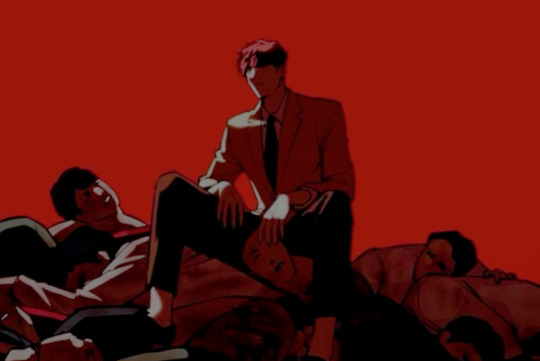


XENIA ゜゜・DG
Xenia, noun: the classical concept of hospitality to strangers. This, unfortunately, includes a wandering dog and his conniving owner—a most irritating, tooth-grinding conundrum the King of Busan has with Charles Choi and his boy-genius. sorry for the wait anon I was away from my laptop for the past week or so! and I couldn't write :'( first meetings and onwards for this particular work haha chicken and egg problem.. haha introspection on business and corruption... haha capitalism pairing: dg (james lee) + male reader warnings: male reader, canon typical violence, arguing (bickering) wc: 3.3k
LOOKISM MASTERLIST
MASTERLIST ・゜・NAVIGATION
In the lengthy chronicles of Charles Choi’s grand plan—to mould the precarious South Korean underground into something far more profitable—James Lee finally came across his very own cause-and-effect conundrum.
What came first, the chicken or the egg? Plutarch initially posed this question in The Symposiacs: a symbolic tug of war between creator and creation. James supposed, in his bored sort of way, that this question described the relationship between cities and Kings as well. Chronically, objectively, the cities existed first—tall structures and unique ecosystems that forged shadowy figureheads to rule the violent underbelly. But poetically, it was rather hard to ignore the hands etching—pummeling—a pathway for the power to flourish. Without those in charge, what were the cities? And without the cities, who were the people in charge?
Parsing the matter, it distilled into who influenced whom.
Of course, the dazzling sprawl of Busan refracting from the glass under his feet was no exception. Even he, who satiated his youthful wanderlust with blood on his fists, couldn’t deny his reluctance to sully this city more. But, what did it matter? The second most important city in South Korea (some would froth at the mouth and argue it was the first for its gateway to Eurasian trade, or at least for its world-class ports) was built from perfectly respectable trade; but alack! it was also protected by its snarling underworld. It had already been befouled: polluted by fists no better than his, trodden by legs more filthy than his own. Blood and toil smeared its golden sand, and its money was just as dirty.
Sure, the city was propped up by honourable (hah) commercial deals, but it was shielded by the illicit ones.
A defiled aegis, if you would.
It was clear the current glitzy glamour of Busan night-life was carefully orchestrated by someone: from the specific mouthfeel the night air had, to the businesses that ran late into the witching hours. Those mythical beings and chaebols who fed and extracted money from this place, in endless loops, were culpable for these towering skyscrapers and glittering lights.
Creators.
In turn, the city cradled your grimy little body—chubby hands wrapping around index fingers of the metaphorical hounds—and made you.
Did this metropolis represent you, or did you represent the metropolis?
It was not in a polite setting that James Lee scouted the venerable King of Busan: arguably the second most esteemed figurehead for the Kings of South Korea. In theory. In theory, since Busan’s reputation as a hub for trade and exalted trade (rather than the mere cold, hard cash ill-reputed other cities offered Choi) entwined with your own. Except, in practice, you were a far more reticent King than anyone could imagine. A shadow to fade into obliquity more than any other shadow.
Underbelly, yes. This was the turf you were most at home in; he could forget all about the glamorous, illegal casinos in basements, he could forget about eavesdropping on business moguls and their lackeys, he could forget about waiting in the entertainment districts for the proverbial snake to finally rear his head.
You were the fucking microcosm of this city: draped with expensive fabric and chainmailed with gold, but the blood on your knuckles stank of impurity. In a parking lot nestled on the outskirts of Busan, he witnessed the King in his court: complete with the luxury, the opulence, and the hamartia of brutality that came with capitalism. Yes, Busan had minted you as a shadowy side to a glitzy coin—as your eyes snapped to where he lounged against concrete, he couldn’t help but observe how your imaginary hackles raised.
Thwomp. Casually, you tossed the grunt beaten black-and-blue to the frigid asphalt, with the magnanimity of tossing breadcrumbs to ducks in a pond. Like the lackey was the bread and James fucking Lee himself was the duck. A bloodied cheek squished into his sneaker, but you merely stared at him owl-like. No, cat-like, because it seemed to be the same nonplussed stare a cat would give someone after bringing them a dead rat.
“Nice city.” Since you clearly had no intention of speaking first. Deftly, his fingers unravelled the mystic plastic of a lollipop: popping the cherry-flavoured candy into his mouth to soothe the acerbic irritation he tasted. “You treat all your guests like this, or do kings not follow xenia anymore?”
It was a rather futile attempt to lighten the mood. After all, if he could help it, he’d rather negotiate to pave the way for the second generation before resorting to throwing his fist. No, that was a lie. His flexing fingers wanted nothing more than to curl into a fist to let off some of the steam he’d garnered from searching for you in this uselessly big city, but fate had him making stupid jokes based on The Odyssey he’d read just last week for his Classics competition. If he rummaged in his pocket, he could probably find the gold medal clanking against hard sweets.
Your expression changed minutely—a slight disturbance in your brows. They furrowed, and for a brief moment James Lee thought his joke fell flat. With all the blood soaked into your expensive garb, maybe you just valued fists over Homeric hexameter. Violence over prose. Brawns over brains. You slinked like shadows. Crude. Ominous. He could barely see your face even with the city lights flashing neon in the backdrop, but when your loping gait came to a halt, there was an exasperation that afforded more subtle nuance to your character. A bitterness to tinge what he thought was mindlessness.
“Mr. Lee.” Your voice curled low in your throat, as quick and elusive as mercury, and perhaps just as poisonous. Shadow King of Busan, the man who never introduced himself to you noticed. Silence was golden, and he suddenly understood why Charles Choi so badly wanted sway over the young King in charge of this port city. “I hope you’re aware that beating my subordinates would invalidate any sort of hospitality between us. You’re no god amongst men either, so ritualistic hospitality is a very weak premise to coerce my amiability with. Try again.”
Deity in the flesh. Perhaps James Lee was the closest thing to breaking the limits of humanity, but all men were fallible. That wasn’t what caused his brow to rise though; going in blind may have been risky, but it was worth it to find someone with a silver tongue like this.
You looked about his age—treading on the precarious cusp between First and Second Generation, fists stained as red as his hair—but you spoke as if you were triple your years.
“You wanna transfer to my school? It’d be fun to have you in the Debate Club,” he said on a whim, but it wasn’t really a whim either. His instructions were expressly to negotiate with Busan—the city was far too volatile to create a power vacuum in. For cities like Ansan, struggle was welcomed; but Charles Choi had too little of everything to contend with Busan, of all places. Just like in Seoul, the situation would resolve itself, and it was far too soon for the HNH Group to meddle in a place like this. “You talk like a teacher.”
His tone was as syrupy as his candy, but there was half-provocation, half-probing-curiosity entrenched in his cadence. Go on, it coaxed, throw a punch. Argue back. Unorthodox was his means of securing cooperation, but he’d have to be a little unorthodox to secure the deal old man Choi had painstakingly written out. A contract between Elite and the capricious man before him, between HNH Group and the microcosm of Busan himself; it sounded like every capitalist’s wet dream.
“Good question, kid,” you smiled, but it was less of a smile and more of a sneer as you ghosted closer to him. Kid, like you weren’t one yourself.
Crack. You stepped, heavy, on the hand of the man you’d pummelled—only his unconscious groan of pain re-alerted James to his existence. “The term isn’t over. You should still be in school. Playing around like this makes me far less likely to listen to whatever you’ve followed me for. Try again.”
The thick scent of metal invaded his personal space as you peeled your black gloves off; the rings beneath them were tinted with the blood that had seeped through the material. Just like that, you callously tossed the garment onto the slumbering man under your feet—though he truly wasn’t sure whether it was a final affront to a beaten man or throwing down the gauntlet towards James Lee himself.
It was a reminder, once again, to not be hasty. There was the real possibility of fucking Charles Choi several times over if he didn’t get this right, but the thought of his imminent doom didn’t seem all too unappealing. On the contrary, he found his heart beating faster—pulse hot on his tongue as an intriguing challenge presented itself before him.
“I’m sure your informants have relayed more intel than just my name,” he mirrored the jagged stretch of your lips. The Legend of the First Generation. The Genius. The original, associated with the base moniker of the Ten Geniuses to show just how unparalleled James fucking Lee was. “Take a guess as to how my scholastic life is going, then consider the opportunity that I’m bringing you.”
Ambiguous. His words were dusted with just enough information to seem straight to the point, but vague enough that it was tantalising. A hook to ensnare the snake of Busan himself. And rather than sating the itch in his fists, he found himself looking forward to a parley instead.
You studied him, appearing to consider his words seriously. Syllables phrased like he was the one with the upper hand, when in fact the HNH group was still tentatively unfurling and in the process of negotiations with both yakuza and Triad alike. He awaited your favourable response, hearing the stats roll into your mind as you calculated the preliminary gains and losses to joining hands with Charles Choi.
Bloodied fingers tapped a rhythm into your jacket absentmindedly. He watched, anticipating your invitation.
“Fuck off.”
“Huh?” he spluttered. Maybe he misheard you. Maybe he finally choked on his candy and induced a coma in which he was now dreaming of your response.
“Your boss sent a high-schooler to broker a deal with Busan.” Your fingers now drummed in irritation against your forearm, but he was just as irritated. He took care of every other prefecture and province, only to have this guy who was his age, nonetheless, tell him his presence wasn’t good enough. Like, what? “Tell old Choi to come himself to negotiate if he wants any sort of foothold in my city. If he truly wanted a respectable contract, why would he send you as a messenger?”
“Excuse me?” If he wasn’t restricted from fighting you—the only exception was valid self-defence—he would’ve made the asshole in front of him eat shit. Alas, Choi wasn’t that generous or lenient. “He sent one of the Ten Geniuses, the primero, for this. I’m one of his greatest assets.”
“Are you a damn car or a person?” you snapped, and it suddenly felt as though he was looking upon an ancient wizard as he lectured a troublemaker outside his tower. His eyelid twitched, and he was finding it quite hard to keep a cool head. “Talking about assets… can’t believe Choi’s sent the guy who’s fucked up all the smaller provinces to deal with us.”
The latter sentence was more grumbled to yourself; it appeared he annoyed you just as much as you annoyed him, which he found a delighted satisfaction in.
“Tell Elite to come himself,” you uttered finally, not even letting him get in a word edgeways as you ambled back into the shadows—not even sparing a glance for the pile of bodies left in your wake.
And despite his objective, despite the imminent yelling he’d no doubt face, he couldn’t help but stare at your blood-soaked coat fluttering in the frigid coastal wind.
Out of hatred, obviously.
・゜゜・
Charles Choi was a conniving bastard. You already knew it, but seeing him in the reception hall really drove the image home. He was polite, a little too polite; yet as soon as you slid that manila folder across the mahogany table, his demeanour prickled into something knife-like.
Snake of Busan, you were nicknamed, but this guy was something else entirely. Once he sank his teeth into your determination to keep Busan flourishing, you could practically see his pupils contract into thin slits. Of course you’d dealt with tricky deals. Weaving through negotiation as though it were a riptide was how you clawed your way to the very depth of Busan’s underworld—navigating until you finally found that crown mired in cess.
Or, more accurately, it was Miss Crystal Choi who’d pierced her venom right where it hurt. A Genius of Business, her father had called her—and boy, did it take all your wit to match her expertise in trade.
But did he really have to bring that guy along?
The scion of the Geniuses was also in your office, leaning against the wall far behind Elite and his daughter. And though nobody asked for his input—not even old Choi spared his prodigy a glance—it still irritated you to no end that he’d tagged along. A bright, cheerful grin cast the sun against the city nightlife on the top floor of your building—one directed right at you, considering the only other two people he knew had their backs facing him. Quite the foolish move, but you weren’t one to concern yourself with people who were basically daylight robbing you. If the dog they’d raised bit them, all the better.
Or maybe he was beaming right at your bodyguard-turned-assistant, who stood discreetly in the shadows of the blinds: slatted light gently cresting over his tall build. Well. It certainly was one of the less strange things Mr Lee had done.
Still, for someone who’d been glaring at you just a week ago, the change felt far too eerie to ignore.
“—and onto the temporary personnel exchange section—” A feeble attempt to pry open the walnut that Busan was, which would only end with the unfortunate bastard failing. You’d choose a loyal subordinate, they’d select someone who was doomed to only grunt work—far from the impenetrable fortress of this building. Boredly, you tapped the pen on the contract, before freezing up at Miss Choi’s next words. “—we’d like to recommend James Lee to transfer to this office.”
A pen snapped, and ink spilled onto the page. Dumbfounded, you barely registered her sliding over a fresh sheet, as though she knew full well this would happen.
No, it was no recommendation. Her very mention of his name was a forceful shove of him into your office. No wonder he was grinning like the devil. No wonder he was here in the first place. At that moment, you wanted nothing more than to leave Busan behind.
Your eye twitched.
He kept smiling—an ominous prelude to the brimstone and fire you were sure to experience promptly.
・゜゜・
“Aren’t I a better bodyguard than that useless one you keep around?”
James Lee had been a bit too quiet these past few days; duly loping around behind the lower-ranked subordinates as they made their rounds, never crossing the proverbial line when you’d handed him his duties as interim grunt. Though, whenever you passed him, his eyes followed the shadows of your fluttering hem—two pinpricks of an arid glare sweeping on your back.
But James Lee was a dog, and whatever command Elite gave him, he’d obey. Heel. Roll over. Serve under the King of Busan for a month. A jester, if you would, with a leash around his neck that kept drawing more and more blood from him. What were the limits? Just how far would he go for the man with a crimson shadow?
“No,” you said. He stood, far too proud, on a summit of lackeys that had been sent your way by one of the companies who’d attempted to cheat their way to getting a more favourable deal. It would’ve been a simple ambush—one doomed to fail—fated to end with you tossing blood-soaked gloves right on them before you postponed the meeting you were on your way to.
But not today. It appeared the limit of the dog of Elite was passing up petty competition with the man two paces behind you.
“Unlike you, Song’s actually pleasant to listen to.” Yes, Song wasn’t the most useful of bodyguards point-blank, but it wasn’t like you particularly needed someone to take care of protecting you. He made people lower their guards. And he made a mean cup of tea. “I don’t have any use for you, so you’re still worse.”
“Semantics,” he shrugged. “I made your life much easier, did I not?”
He was smart. Too smart, but you already knew that from the intel that had not yet been erased. Hushed up, because of course Elite would painstakingly conceal his cards.
And unfortunately, you were always drawn to a risky hand. A pleasure far removed from the mundane violence of your everyday life—a heart-pounding thrill of betting all your chips in a hazardous (though not desperate) gamble.
“Maybe.” For it was one day removed from the multitudes of late meetings and burdensome glove changes. Your hands weren’t seeped in oily red, sliding and dripping onto your expensive clothes that were tailored—though still felt so fucking ill-fitting that it made you sick—right to your body.
You considered the man toeing carefully past the dogpile located against a cargo container: donning what could’ve been your life. A beige school uniform, pinkie slightly indented from books and study, pen marks still dotting his fingers. Closer. He ambled lazily to your direction, and as he approached with the dying sun behind him, you could see his smile. Just as languid as the day you first met him, and just as irritating.
Closer. Strawberry candy laced the iron odour, though you could faintly taste lemon in the profile too—testament to the yellow wrapper stuck crudely on one of the men. Closer—he was far too close now, standing chest to chest while he stared directly at you.
If there was one thing that came from this ill-fated encounter, it was probably the permanent furrowed brows that decorated your perplexed face—the bloodhound had been reduced to this fluffy thing demanding your attention.
And it was just as unfortunate that your impression had been chipped away for him too—a King whose expressions were utterly delightful to witness. A straight mouth, grinning ever-so-slightly when a deal went your way. A routine rhythm to your biro tapping your notepad. Eyes that shone with practical constellations as you breathed the briny air of the port in.
A particularity to the way you treated others, steely to the strong, awkward with the weak. So utterly flustered, when it came to tiny kids tugging on your long coat, or the grandmas you lent your arm to on the streets. If he had to compare it, he’d attribute your personality as a non-Newtonian fluid: your very own mix of cornstarch and water. Tough with pressure, all soft without.
Like now.
“Come on,” he whined. Psychologically, he was doing a damn good impression of pitifulness—even if you’d just witnessed him commit a beatdown so one-sided that you could feel the second-hand pain. And little by little, he was watching you falter: breath caught in his throat as he watched your brows default to their furrow once more. “I saved you a good few minutes, didn’t I? Don’t tell me Busan can’t even acknowledge hard work and effort.”
“Fine, whatever,” you crumbled just like that, under the heavy weight of his triumphant eyes. “Good job.”
So cute, he thought, then froze almost immediately the moment the words came to mind.
Fuck.
・゜゜・
#slowd1ving#res ・゚ writing#x reader#male reader#x male reader#ask slowd1ving#anon request#requested#lookism#lookism x male reader#lookism manhwa#manhwa x reader#manhwa x male reader#dg x reader#james lee x reader#pre dg james lee
200 notes
·
View notes
Text
So, given everything that's happened in recent hours, I thought I might give people who don't know about Gundam some stuff to learn about. Hopefully I can give a balanced and not-racist take like some people.

What is Gundam?
Created by Yoshiyuki Tomino with help by Yoshikazu Yasuhiko and animated by the studio Sunrise (currently Bandai Namco Animation, though I refuse to call them that), the original Mobile Suit Gundam released in 1979 to initially-limited success, though would gain popularity through a combination of fujoshis shipping the characters, the sale of plastic model kits referred to as "Gunpla" and a recut of the series into three compilation movies throughout the early 80's. And as of 2024 is the 66th highest-grossing media franchise of all time, beating out Scooby Doo, Minecraft and the Simpsons.
Also, I'm pretty sure it's what sparked Japanese sci-fi's obsession with O'Neill Cylinders.
The original anime takes place in the year 0079 of the Universal Century, where the Principality of Zeon: a nation composed of orbital space colonies declares a war of independence against the Earth Federation. This "One Year War" has already claimed half the human population by series start and is waged through the use of "Mobile Suits": bipedal mecha powered by a fusion reactor capable of effectively fighting out in the reaches of space.
Main character Amuro Ray is the son of a Federation engineer who lives in an out-of-the-way space colony, though soon finds his home under attack by a Zeon infiltration. After finding the secret Mobile Suit project his father was working on: the RX-78-2 Gundam, he fights off the Zeon invaders, though finds himself and a bunch of other kids conscripted by the Federation to fight the forces of Zeon aboard the ship the White Base. Throughout his journey, Amuro and the Gundam fight many battles against Zeon, including against their mysterious masked ace pilot Char Aznable.
The series was responsible for the codification (but not creation, people get this wrong all the time) of the "Real Robot" subgenre of mecha, where the robots were relatively more realistic and used as weapons of war as opposed to the more fantastical "Super Robot" subgenre pioneered by Mazinger Z and Getter Robo.
A major theme of the show, and the franchise as a whole is "War is bad", as demonstrated through this meme:
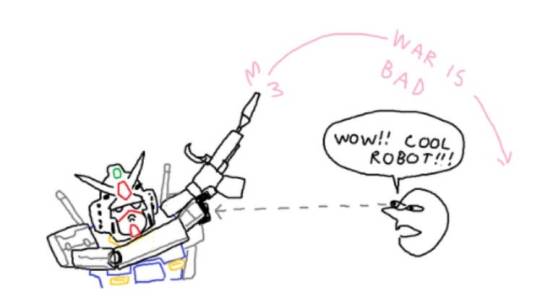
Yes, this is the original version of this meme format.
Anyway, Tomino, a renowned pacifist who grew up in the shadow of Japan's involvement in WW2 tried to use his platform as an anime director to try and tell a story that would get people to realise war's futility and brutality.
So I hear you asking, "That's nice and all, but what about the space lesbians who beat Destiel on their home turf?" Well, let's get into that.
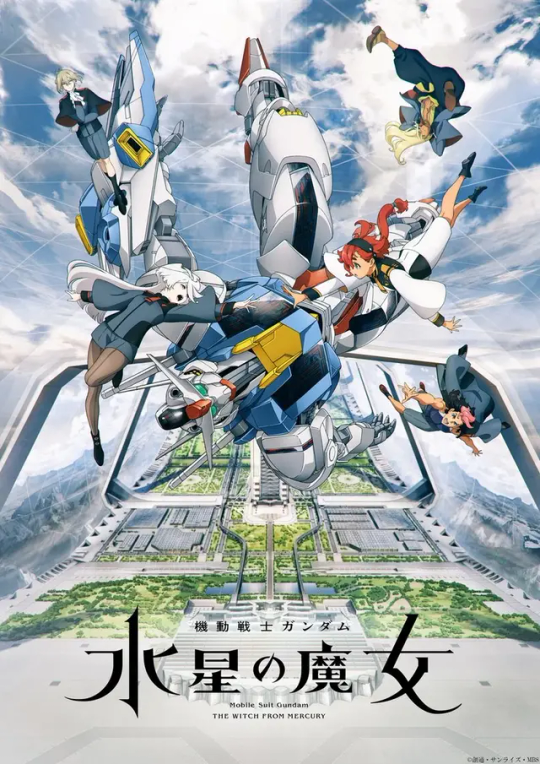
What is the Witch From Mercury?
Mobile Suit Gundam: The Witch from Mercury, or "G-Witch" for short is one of the more recent entries in the Gundam Franchise and a (very) loose adaptation of William Shakespeare's The Tempest. Set in the year 122 Ad Stella, the solar system is under the de facto control of the Benerit Group: a megacorporation with borderline-medieval internal politics that maintains a system of capitalism that benefits Spacians at the expense of those who live on Earth.
Main heroine Suletta Mercury enrolls at Asticassia School of Technology owned by the Benrit Group at the behest of her mother: CEO Prospera Mercury of the Mercury-based Shin Sei Development Corporation, and wins a Mobile Suit duel against a bully in her own MS: the Gundam Aerial. This however means she has now won the hand in marriage of daughter of the Benerit Group CEO: Miorine Rembran, beginning a series of consequences that shape the very political landscape of the solar system.
G-Witch was a massive hit, both critically and commercially. The first episode: the Witch and the Bride attracting record numbers for the studio and the Gunpla kit for the Aerial is currently the best-selling Gunpla kit ever.
Contrary to popular belief, G-Witch is not the first piece of Gundam media to feature a female protagonist. That honour would go to the 2002 Japan-only manga École du Ciel, nor would it have the first queer main character, which goes to 1999's Turn-A Gundam (and if you were to ask any fan of the series, they'd so it goes back to the very beginning). But it became notable for its lesbian representation in anime (in spite of Sunrise's attempts to downplay it, to the anger of the director, writer, producer, artists, animators, cast, fans and even their own parent company Bandai Namco who forced them to back off).
One thing I need to clarify: You don't need to have watched the original series to enjoy G-Witch. They're not even in the same continuity.
So if you're interested in the series and you've only watched G-Witch, I'll give out three recommendations for you all to enjoy:

Mobile Suit Gundam 00
Gundam 00 takes place in the year 2307 (the only series to use our own calendar), where the world is divided between three global superpowers: The Union of Free & Solar Nations (The Americas, Australia, New Zealand and Japan), the Human Reform League (China, South, East, Southeast and Central Asia) and the Advanced European Union (all of Europe, including all of Russia west of the Urals) who each control a space elevator near the equator and wage proxy-wars in Africa and the Middle-East over Earth's dwindling resources. This eventually culminates in the emergence of Celestial Being: a terrorist group consisting of Setsuna F. Seiei, Lockon Stratos, Allelujah Haptism and Tierria Erde, all of whom use powerful "Gundam" Mobile Suits and try to forcefully impose global peace on the Earth.
00 is pretty slow-paced and is more about the world than the individual characters, but said characters are really well-written, especially the characters from the three power blocs who are the de facto protagonists as they try to stop what are in their eyes a bunch of crazed terrorists preaching a hypocritical and incoherent ideology of "peace through force".
And to address the elephant in the room, this series is VERY post-9/11. Constant talks about terrorism, proxy-conflicts in the global south (especially the Middle-East), religious extremism, dwindling resources and the wars fought over them. While the franchise has always been political and of-its-time, you can just tell 00 was made in the mid-2000's. Again, it's good. But just something to keep in mind.

Turn-A Gundam
Turn-A Gundam is one of the weirder elements of the franchise for a myriad of reasons. Not the least of which being its unique setting taking inspiration from the famous sci-fi novel War of the Worlds.
In the Year 2345 of the Correct Century, human civilisation is at a level of technology reminiscent of the late-19th/early 20th centuries, save for the Moonrace on... well, the moon. As part of their queen Diana Soreil's plan to reintegrate both Lunar and Terran societies, several scouts are sent to the planet to set up their return to the planet. One such scout: Loran Cehack integrates into Terran society as a driver for the wealthy Heim family, though at a coming of age ceremony for the family's second daughter, a member of the Moonrace attacks the technologically-inferior Terrans. However, a mysterious mustached statue breaks apart to reveal a "White Doll": the Turn-A Gundam, allowing Loran to fend off the invaders. rest of the series becomes more of a mystery to how the supposedly-peace loving Moonrace could allow of such brutality.
The setting of the Correct Century timeline alone is one of the draws of Turn-A, though its excellent characters and compelling mystery also help a lot.
I do however have two warnings for people interested in watching it. The first is that this series was never dubbed. While it did receive an official sub in 2015, there still isn't a dub for the series. So if that bothers you, there's your warning.
The other is that there's a pretty big twist in the latter part of the series that while I will not spoil it here, it's such a big deal that I can't not mention it. It doesn't make any sense, and it actively detracts from not just the series, but the whole franchise. You'll know it when you see it. It doesn't ruin my enjoyment, but a lot of people don't like Turn-A for that alone.
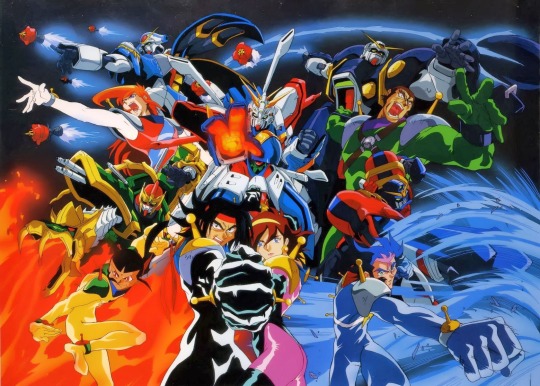
Mobile Fighter G Gundam
Favourite entry. Don't care. It's peak.
In the Year 60 of the Future Century, war has been abandoned by the nations of humanity in favour of the Gundam fight: a quad-annual fighting tournament between Gundams representative of the countries of the world where the winner rules space until the next Gundam fight, all while leaving the Earth ecologically devastated in the fighting. Neo-Japan's Gundam Fighter: Domon Kasshu arrives on Earth seeking information on his older brother Kyoji, who killed their mother and led to their father's arrest before stealing the experimental Devil Gundam to Earth, beating up every Gundam Fighter in his way. However, he eventually learns of far more dangerous revelations about the incident.
G Gundam is to put it bluntly: bat-shit insane. And I love it. It basically took a look at the then-stagnating franchise in the wake of the wet fart that was Victory Gundam and said "I know what can save this franchise, Bruce Lee movies!" And it somehow worked.
Word of advice: watch it dubbed. Mark Gatha absolutely kills it as Domon every time, and puts just the right amount of ham into every line.
So yeah, that's some stuff on Gundam. This was a long post to write out. I'm gonna take a break now.
#gundam#sulemio#g witch#destiel#ao3topshipsbracket#msg#mobile suit gundam#mobile suit gundam the witch from mercury#tumblr top ship bracket#gundam suisei no majo#supernatural#the witch from mercury#witch from mercury#history lesson
280 notes
·
View notes
Text
You love taking care of people: Fine Dining in the Time of Late Stage Capitalism
CW: this post discusses toxic and abusive workplaces and makes brief mention of institutional child abuse and intergenerational trauma. I might also talk about global systems collapse, for shits and giggles. Also this is another long one. You know the drill. Lets have a cuppa. Also this is my last minute submission to Sydcarmy Week 2024 and the theme of “you love taking care of people”. Enjoy!
I have a confession to make to The Bear fandom:
The food is my least favourite part of this show.
Its not that its not interesting. It definitely is. I'm a home cook and for the most part, I enjoy cooking (when I can do it at my leisure and not like most mothers, while balancing the mental load). I just find all the other aspects of the show much more fascinating.
In fact, I think this show about a bunch of cooks in commercial kitchens is so popular not so much because of its take up of cooking but its unflinching and loving interrogation of grief and trauma, including the kinds that get passed down through families.
The truth is, I've also never been overly excited about the world of "fine dining." I grew up in a large, Tamil family and so our meals were big, shared and not necessarily conducive to the minimalist plating preferred in exclusive, "gourmet" spaces:
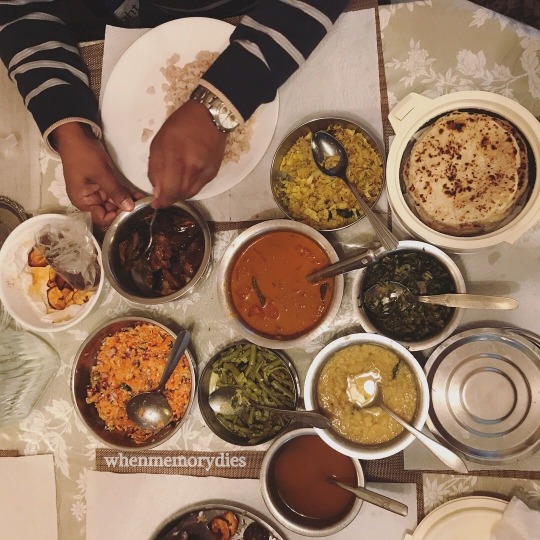
Photograph is mine, delicious Jaffna Tamil spread is the handiwork of my great aunt (Kunchi Ammamma or “little maternal grandmother”), arguably the best cook in our sprawling, extended family.
As tumultous as family life could get, I often experienced meals (that, lets be real, were almost always prepared by the women in my family) with my loved ones as a happy experience. I mean we also had our share of blow ups at the kitchen table but what was always consistent was the love and care that went into the food that we were given to eat. It was woven into the rich and complex flavours that made up the curries, varais, and sambals we had on our plates (and that even now, make me salivate just thinking about). It was spread throughout the warm, coconut-y rotis and steaming rice and puttu we ate with our hands and used to mop up all that spicy, flavourful goodness.
And if there's one question I heard more than any other from older family members growing up, it was "ni sappittiya?" ("have you eaten?"). More than "how are you?" and definitely more than "I love you." As with many Global South cultures, for Tamil folks, food is used for nourishment but also as a primary means of conveying deep care. Obviously Tamil people don't have the monopoly on using food to show their affection (or even the monopoly on using food to replace actually saying the words "I love you" lmao). Food has been found to increase interpersonal closeness and can also contribute to emotional regulation. Feeding a child is one of the first means of bonding between parents and children. Food also plays a big role in the course of romantic love: as a basis for first dates and future time spent with a partner, and of course also as an aphrodisiac.
As Cesar Chavez, Mexican-American civil rights activist, labor organiser and co-founder of the National Farm Workers Association (which later became the United Farm Workers union) said,
The people who give you their food, give you their heart.
You love taking care of people
Conveying care and love through food is a theme that comes up repeatedly in The Bear. Recall 1x02 Hands and the phone conversation with Nat and Carmy:

Natalie: Chefs always say a big part of the job is taking care of people, right?
Carmen: Yeah, yeah. No I guess.
Also recall an almost identical bit of dialogue between Carmy and Sydney, under the world's most famous table that had absolutely nothing wrong with it in 2x09 Omelette:

Carmen: You love taking care of people.
Sydney: Yeah I guess.
Here's some further mirroring between Sydney and Carmy about giving people joy through food. Recall again the phone call between Carmy and Nat in 1x02 Hands:
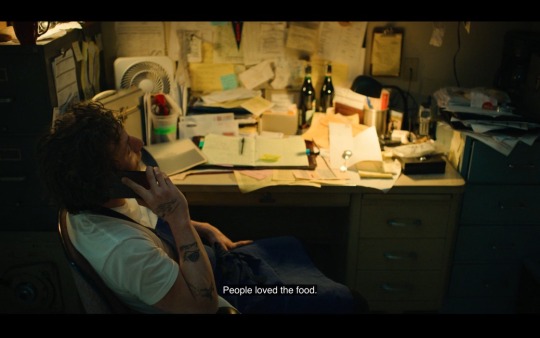
Natalie: When did the breathing problem start?
Carmen: I think maybe sometime in New York. I was throwing up every day before work.
[...] Chef was a piece of shit.
Natalie: Then why'd you stay there?
Carmen: People loved the food. It felt good.
Also recall the conversation between Sydney and Marcus in 1x08 Braciole:
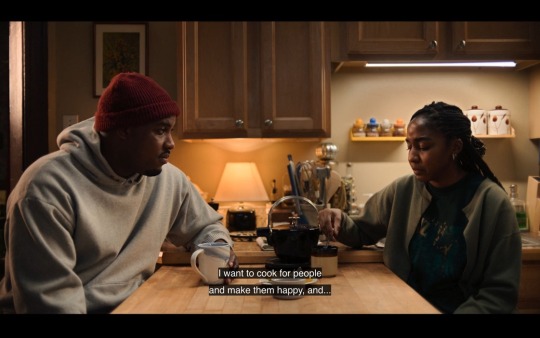
Sydney: I want to cook for people and make them happy, and give them the best bacon on Earth.
Be gentle with each other, so that you can fight stronger together: seasons 1-2 of The Bear
As rough and tumble as The Beef was, the clear throughline in season 1 (when The Beef was in operation) was the importance of the relationships and care between the show's characters. This was also the case in season 2 where the majority of the season was spent in the context of renovations and training prior to the opening of The Bear (in that season's last episode).
In season 1, we had Carmy leading the crew at The Beef by being patient, clearly explaining technique and positively reinforcing his staff's work.

Above left: Carmy walking the BOH crew through making Donna Berzatto's Lemon Chicken Piccata in 1x05 Sheridan. Above right: Carmy encouraging the crew to keep up their current pace in 1x06 Ceres.
We saw him working with Sydney, supportively encouraging the team to go further, to push themselves. We even saw Carmy at ease enough to talk about Mikey and his mother while at work. We had a Carmy showing us how integrated he can be.

Above: Carmy and Tina in 1x05 Sheridan
Heck, we even had a Carmy who wanted to get a compost installed at The Beef for processing food so that it didn't go to waste. Recall this golden bit of dialogue between him and Sweeps in 1x01 System:
Carmen: Eh yo Gary, you set up a compost for me today, Chef?
Sweeps: After I do my thing in the place.
Carmen: That's very clear. Thank you.
We had a Carmy who had time. Recall the below scene in 1x02 Hands before Sydney gives Carmy her draft business plan for The Beef (that she drafted on her own initiative and time to support his family's struggling business. If this man doesn't hurry up and fight for her in s4 istg...):
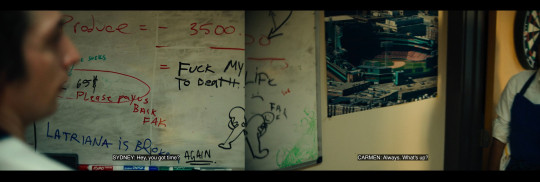
Sydney: Hey you got time?
Carmen: Always. What's up?
Similarly, we had Carmen in the first episode of season 2 making time to talk to a clearly distraught Richie:
Richie: Yo you ever think about purpose?
Carmen: I love you, but I do not have time for this, alright? *starts to walk up the stairs out of the basement*
Richie: *Nods, looks dejected, sniffs*
Carmen: I have time for this. *comes back down the stairs and sits with Richie*
Most pointedly in season 1 we had the conversation between Sydney and Carmy in 1x03 Brigade which lays the blueprint for their joint vision for the restaurant and which should have acted as a touchstone for both of them in season 3:

Sydney: You know, I think this place could be so different from all the other places we've been at. But in order for that to be true, we need to run things different.
When I said I didn't think that the brigade was a good idea, you didn't listen. And its not that you told me that I had to. [...] But you just didn't really listen and if this is going to work the way that I think we both want it to work [...] I think we should probably try to listen to each other.
Carmen: Yeah. You're right.
Sydney: The reason I'm here and not working somewhere else, or for someone else, is 'cause I think I can stand out here. I can make a difference here. We could share ideas. I could implement things that make this place better. And I don't wanna be wasting my time, working on another line or tweezing herbs on a dish that I don't care about, or running brunch, God forbid.
Carmen: *nods vigorously*
In season 2 while The Beef undergoes its facelift into The Bear, some of the show's most beautiful moments were when characters displayed their faith and trust in one another. Recall 2x01 Beef where Sydney asks Tina to be her sous chef, or 2x02 Pasta where Sydney and Carmy send Tina and Ebra to culinary school (and Tina's unwavering belief in and support for a nervous Ebra once they get there), and 2x03 Sundae and 2x04 Honeydew where we see Carmy and Sydney send Marcus to Copenhagen to stage with Chef Luca and build up his skills as a pâtissier.

So what happened at The Bear?
Season 3 of the show has been the most divisive of the series, with its preceding two seasons being almost unanimously adored by fans and critics alike. There's been a lot of debate on here and elsewhere as to why this is the case. What appears to be a dominant line of reasoning in this regard is the shift in Carmy and his approach to running The Bear as a fine dining institution.
At The Bear, we have Carmy as an Executive Chef who's berating, hostile, and blaming everyone else for his emotional state ("You guys are fucking killing me"). We have a Carmy who has taken "every second counts" to a point so minute that he has given up smoking because of the time away from the kitchen that it will cost him. We have a Carmy who has no patience for his team, almost all of whom have no experience working in fine dining before the opening night of The Bear. We see how out of sync Carmy and Sydney are ("Been off"). We have a Carmy who is reverting to patterns of behaviour that have been modelled for him by two of his abusers: his mother, Donna Berzatto and his previous boss, Chef David Fields, Executive Chef at Empire.
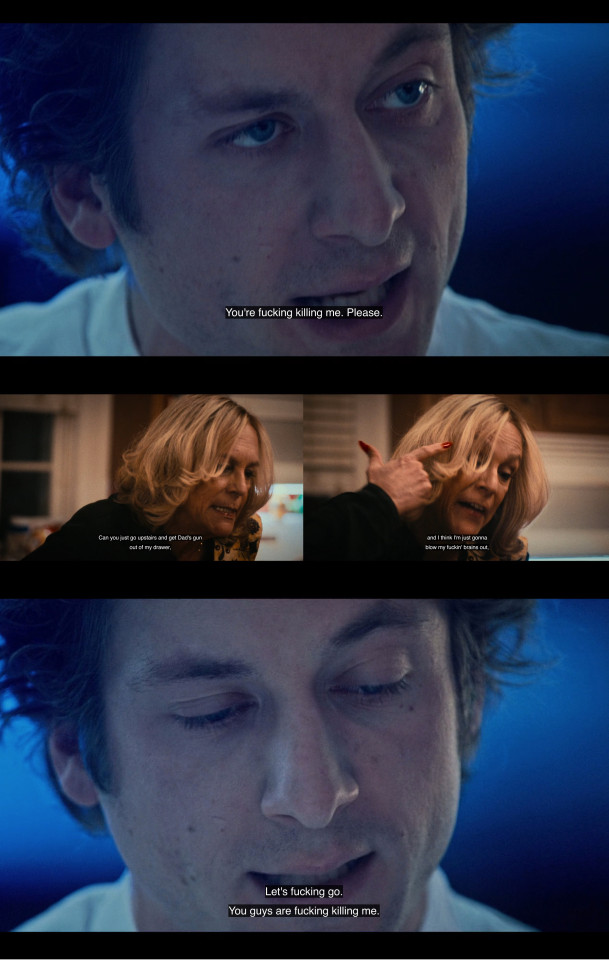
Perhaps second only to Donna and her stand in Claire, Chef David Fields' toxic legacy haunts season 3 of The Bear.
This is nowhere more clear than in the sheer wasting of food and money in season 3 epitomised by Carmy's insistence on changing the The Bear's menu every day (to quote Tina: "Every day, Joffrey Ballet?!") and his repeated throwing out of dishes he deemed "not perfect."
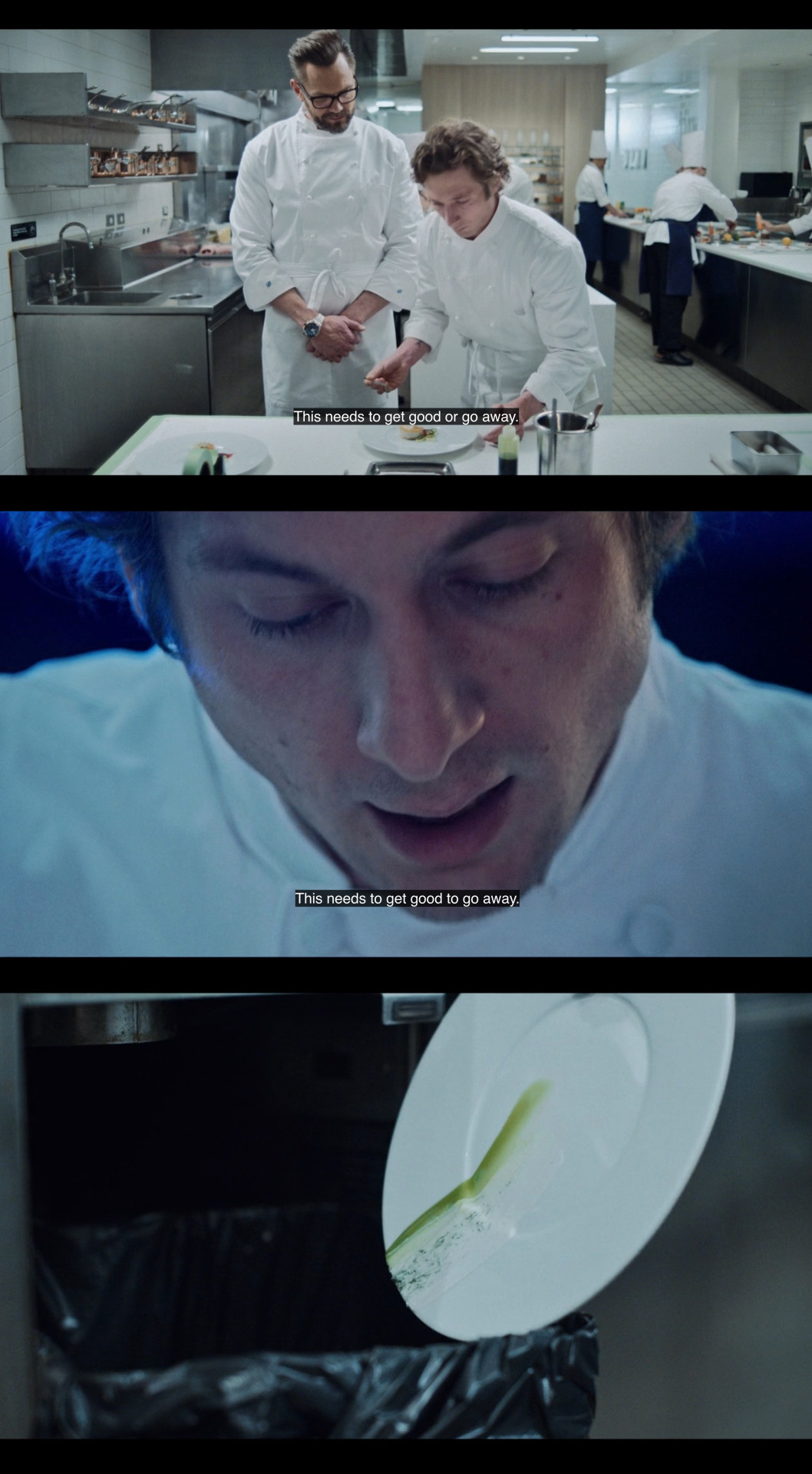
The waste did not go unnoticed by other characters on the show. Recall Natalie telling Carmy off in 3x03 Doors:
Natalie: The menu cost is out of control.
Carmen: Nat, figure it out.
Natalie: Oh. Oh. Figure it out? Wow.
Carmen: Figure it out.
Natalie: Why don't you fucking figure it out?
Carmen: I'm trying to use less shit.
Natalie: Okay, well, whatever you're doing, the R&D [research & development] of that, its fucking us.
Carmen: Well, we're using the best shit.
Natalie: Duh. Duh. Well, duh.
Carmen: Duh? Don't duh. No duh. [lmao this dialogue]
Natalie: Don't buy fucking crazy shit and then use it once, Carm. It's so wasteful. Duh! Duh, duh. Fucking duh, bro.

In episode 3x05 Children, Uncle Jimmy commissions The Computer to come in and run analytics on The Bear in an effort to get its costs under control (LOL at his assessment below, scrawled on the back of the dodgiest looking pie chart I've ever seen):

Computer: This sample is based on the month and a half we've been operating and does not take into account any funds spent previously on build, friends and family budget, other assorted fuckery.
Carmen: I mean, there hasn't been that much fuckery.
Cicero: Oh neph. You specialise in the fucking fuckery, bro.
Uncle Jimmy had plenty to say about Carmy's use of the former's funds (which Jimmy has duly invested in The Bear to support his nephew) including Carmy's decision to spend $11,268.00 on Orwellian butter (aka Dystopian Butter from the Fucking Rare Transylvanian Five-Titted Goat, lmao).
Even Carmy was under no delusions about how wasteful he was being this season. Recall his discussion with Sydney in 3x05 Children:
Sydney: You know what we should be doing?
Carmen: Produce vendor. You don't have to say it.
Sydney: Okay, I didn't say it then. I didn't say anything. Do you want me to say something?
Carmen: That I'm jamming us up 'cause we have a new menu every day and the economics aren't great?
Sydney: Well, I'm an accomplice, so...
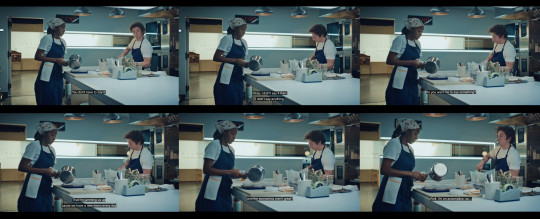
Note: the language in this small bit of dialogue struck me as being off. Why does Sydney needs Carmy's permission to say anything? Its like she knows that he knows the constantly changing menu and exorbitant expenses are an issue but doesn't want to say anything until Carmy brings it up first. @yannaryartside has a great break down drawing the analogy between Sydney's "accomplice" confession here with Molly Ringwald's (sorry I dunno what her character's name was) confession about facilitating her partner's substance abuse, during an Al-Anon meeting in 1x03 Brigade.
We have Carmy repeating harmful patterns of behaviour at work that he has picked up from his personal life (for example, from his mother) but also from his professional experience.
The world of fine dining that both Carmy and Sydney came to The Beef from was marked, by their own admission, with "complete and utter psychopaths" who screamed, pushed and yelled at their staff (recall Sydney's disclosure to Carmy at the end of 1x05 Sheridan) or "fucking assholes" (in the case of Chef David Fields), who made their staff "very, probably mentally ill." Sadly, this aspect of The Bear is not fiction. @moodyeucalyptus pointed out in this post that both Carmy and David Fields appear to have elements of their characters based off of real life fine dining wunderkind Chef Charlie Trotter: a Chicago-based chef known to be brilliant but who mistreated his staff so badly that he had two class actions brought against him (one by FOH staff, and another by BOH staff led by James Beard Award winner Beverly Kim).
There are other stories about the grinding nature of the fine dining industry which we'll get into below. We'll also look at a few stories of chefs who are leading a renaissance away from the "toxic, hierarchical shit show" that has historically plagued fine dining and who Joanna Calo and Chris Storer may have front of mind as they take us through Carmy and Sydney's journey together in season 4 (because as tempting as Shapiro's offer is, we know Sydney isn’t leaving Carmy). But first, we need to go further back in time to look at how the fine dining industry itself has created the conditions for a chef like season 3 Carmy to exist in the first place. Lets look at the system, baby (to quote Tina in 1x01).
The Bear's culinary ancestry: Chef David Fields and the Fine Dining Industry
I should say that I did not want to go too far into history with this post. After Carmen, Natalie, and the Berzattos, I was committed to trying to write shorter meta (/snort). But I'd be remiss if I didn't talk about the origins of fine dining, and before that, the rise of Europe as the base of "haute cuisine" (which itself is directly tied to its history of colonialism and...Empire *badumbum* @freedelusionshere has made the point that The Bear writers have given Chef David's restaurant the name Empire purposefully and they're not wrong). All of this informs the current state of fine dining today.
Though France is often credited as the place where restaurants began (in the 1700s), its been established that folks were eating in communal restaurant settings all over the world, including in China about 700-600 years earlier. The origins of western fine dining (the tradition that Carmy and Sydney have trained within) however, are synonymous with French cuisine and the efforts of Georges Escoffier (who Carmy name drops in 1x03 Brigade).
The French Brigade
Escoffier was responsible for developing the French Brigade system of organising kitchen staff which is still used today in many restaurants worldwide, including at The Bear. The French Brigade was based on Escoffier's own military experience in the Franco Prussian War and was set up to identify roles in the kitchen and increase efficiency and consistency so that restaurants could scale their work to serve larger numbers of customers.
The thing with anything based on structures found in the military is that its going to replicate hierarchy (a chain of command is central to the running of military operations). In fact, much of 1x03 Brigade is spent with Sydney resisting what she identifies as the imposition of a "toxic hierarchical shitshow".
Mariya Moore-Russell, the first Black woman in the world to get a Michelin star (who also happens to be from Chicago) talks at length here about the benefits of the French Brigade for systematising commercial kitchens but also how easily it can get corrupted if the wrong people are in the kitchen. She says in those circumstances, the Brigade can quickly perpetuate, racism, sexism, perfectionism and "all of the isms." My fav quote from the video? When Russell talks about the French standardisation of cooking adopted by most kitchens in fine dining industry (at 23:39):
They were like okay, how do we take what Grandma does, what Mama does and make it you know efficient and consistent but also just extremely stressful for everybody involved? (lmao)
Note: Moore-Russell has a series of videos on YouTube about her experiences in fine dining which are very illuminating. She's also such an engaging storyteller. For example, watch "My path through the restaurant industry".
Service à la française to service à la russe
In addition to the French Brigade, another development in the history of western fine dining was the shift in styles of food service from service à la française to service à la russe. Service à la française ('service in the French style') involved serving all the dishes for a meal at once, allowing patrons to serve themselves. Think something akin to buffet style. See below for table layout using service in the French style from 1775:

Source: Wikipedia.
To me, service in the French style looks kind of similar to how my Tamil family lays out our meals (as can be seen in the first picture of this meta, minus the pheasant, moonshine and roasted woodcocks...lol). This style of service also looks a whole lot like "family style" dining which can be described as: "when food is brought to the table on large platters or serving dishes rather than being individually plated. Guests then serve themselves from the dishes which are passed around the table." In fact, service in the French style or family style dining is how many cultures serve and eat their food, both in the home and in restaurant settings (whether they use these terms to describe that layout is another matter).
I also seem to recall a couple of soulmates Jeffreys deciding to open a family-style restaurant in 1x08 Braciole (which @bootlegramdomneess has also pointed out in her post here).

In the 19th century, service in the French style became replaced in European restaurants by service à la russe ('service in the Russian style'). This style of service is what Western fine dining and haute cuisine restaurants utilise to this day. It involves bringing courses to the dining table in sequence, one after the other. Courses are portioned and plated before being brought to the diner by service staff.
In the case of Western fine dining, Escoffier shaped haute cuisine ('high cooking') through the use of his French Brigade system and the implementation of service in the Russian style. Haute cuisine has undergone shifts and changes since the 19th century including with the nouvelle cuisine movement in the 1960s which was marked by a focus on fresh produce, paired-back menus and a focus on invention. Haute cuisine of today has been described as a fusion: employing elements of nouvelle cuisine and more elaborate techniques and processes from Escoffier's system.
To my mind, service à la russe involves a lot more people (definitely more wait staff) to have it deployed effectively. When you have more people, you have more room for error (like all those dropped dishes in season 3). Family style service or service à la française allows people to serve themselves. It encourages sharing. Personally, I prefer the latter. Also can we talk about how small the portion sizes are in haute cuisine? lmao. I get it, its art. You need a gigantic plate for a small piece of hamachi because thats the canvas. Some (read: me, lmao) might also say its big ol' waste to wash a plate that size for food that takes up maybe a 1/5 of its surface area. Can we also talk about the concept of "chargers" (which the Computer rightfully rips into Carm and Sydney for in 3x05 Children) - why do you need a table setting that no one's gonna use? I'm sure there's other aspects to haute cuisine that make no fucking sense but honestly this meta is gigantic enough as it is so I'll stop there lol.
Anyway, notably it is service à la russe and food that would be described as haute cuisine that we see at The Bear. Family style is nowhere to be seen in season 3.
Colonialism, Empire and the rise of Western food cultures
A fact that is often left out of discussions about why the French and other European countries developed such globally renowned food cultures as well as their staggering wealth and status as "first world countries" (particularly in the period between the 1600s to the 19th century) was that at around the same time, these nation states were expanding their own empires by colonising other parts of the world with the express purpose of acquiring ingredients (and other resources) that they did not have access to in Europe. A brief and non-exhaustive list of examples below:
Europe's demand for flavour was so great in the 1600s that the Dutch traded Manhattan to the British in order to secure the Indonesian island of Banda Run which, at the time, was the world's only source of nutmeg. When they first arrived in the Banda Islands, the Dutch killed and enslaved much of the Bandanese population, taking control of the island's local nutmeg plantations. This violence would come to be known locally as The Banda Massacres.
It was the hunt for a direct trade route with India for black pepper that Christopher Columbus used to pitch his voyage to the King and Queen of Spain and which ultimately led him to the Americas. Columbus' arrival precipitated the colonisation of the Americas, which resulted in enslavement, disease and outright genocide, decimating First Nations populations throughout North and South America.
The colonisation of the Americas would also lead to the exporting of various foods that have come to be staples in European cooking. For example, the tomato - the key ingredient in many Italian (and Italian American) dishes - orginated in South and Central America and was brought to Europe via Spanish colonists.
The British set up their infamously brutal East India Company (EIC) to control the Indian subcontinent and the trade of various resources including precious metals, opium, textiles (silks and cotton), spices (such as cinnamon, black pepper, nutmeg, cloves, mace) and other food items (like salt, sugar, coffee and tea). The EIC would later be supplanted by the British Raj in Britain's stranglehold on India and after almost 200 years of imperialism and economic fraud, it has been estimated that the British drained India of nearly $45 trillion. I can't even begin to fathom an amount of money that large but the British could, and that theft powered much of the empire during its height.
The influence of Indian ingredients and cuisine spread throughout the British empire, including back to Britain itself. In fact, through colonisation and empire, Indian influences appear in various global cuisines (including other European cuisines as well as in the Caribbean).
Indeed the British's impact on food globally included its colonisation of Australia and New Zealand. These two colonial outposts essentially became gigantic cattle and sheep runs for the British who facilitated the wholesale theft of land - and in the case of Australia, did so without even bothering to enter into treaties with First Nations people - in order to run livestock that was then exported to feed Britain.
In order to satisfy its sweet tooth, France operated huge sugar plantations on the backs of the labour of enslaved Africans, particularly in Haiti (known at the time as Saint-Domingue). In the late 1700s, Haiti was responsible for exporting 40% of all the sugar consumed in Europe. The human cost of this was high and brutally violent. Eventually in 1803, after many armed revolts, enslaved African-descent people kicked the French out of the country after over a hundred years of heinous exploitation (thereby creating the first Black republic in the world). The French were so economically dependent on the colony for its production of coffee and sugar that when Haiti got its independence, France decided to punish the new republic for the loss of future income on Haitian exports, demanding 150 million francs in gold as compensation. The French sent warships to enforce this cruel debt. All in all, Haiti spent approximately $21 billion paying off France for the freedom that its people had already lost their lives and shed their own blood for. The debt (which involved the fledgling republic taking out exorbitant loans and fundraising amongst its citizens) was not paid off until 1947: 122 years after it was initially enforced. The French even charged Haiti interest.
Were it not for its vicious history of slavery and its century-long extortion of its former colony, I'm pretty sure France wouldn't have had the quantities of a certain key ingredient necessary to develop its worldwide reputation for pastries and desserts. I mean, you try making a crème brûlée, an eclair, a tarte tatin, a sweet galette, a mille-feuille, a madeleine, a crepe...without sugar.
This history deeply informs fine dining today. For centuries, Europe underdeveloped much of the world (borrowing Walter Rodney's turn of phrase) through colonialism and imperialist extraction. It then used those spoils and excess wealth to, among other things, develop its own food cultures and then self-proclaim itself as the cutting edge of the culinary world. To be clear, you can only faff about in a kitchen and create fancy sugar palaces and 10-course meals if you have the means and resources to do so. Haute cuisine is a product of wealth and resources, accumulated over time. Europe's colonial history also dictates which cuisines are recognised via awards like the Michelin star system. Hell, it dictates why you have the French (Michelin is a French tire company) dictating what constitutes "good" food in the first place. If you want to read more about this topic, this essay on Medium provides a good overview of the sad, racist state of affairs over at the Michelin Guide.
Where Europeans colonised and settled, this same lens was applied. This is why you have the undervaluing of Indigenous cuisine and ingredients in Australia, a situation which has only recently begun to shift. The colonisation of Australia actively involved the lying about Aboriginal foodways in Britain's attempt to falsely claim that Aboriginal peoples were nomadic hunter gatherers who did not use their land. Its why the history of how enslaved Africans brought their food cultures with them through the Door of No Return and transformed American cuisine, is not more widely known. Its why so few chefs of colour have been recognised for Michelin stars globally.
Empire and The Bear
Season 3 of The Bear pays clear homage to the impact of European empire on the world of fine dining in a few ways. The most obvious is the fact that Chef David's restaurant is literally called "Empire" lol. Another example and one of the most visually striking to me occurs in 3x01 Tomorrow. First, recall Chef David Fields' outright theft of Carmy's dish (I think we've established that you can't get more empire than the theft of food, yes?). Can we talk about how not only did Fields steal Carmy's dish but also, turned it into the most beige meal we've seen on The Bear to date, bar that single sprig of dill fighting for its life?
Carmy's penultimate plate (the final version being The Best Meal That Sydney Ever Had™):
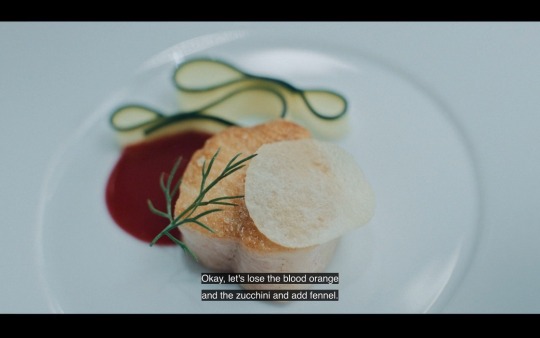
Chef David Fields' dick measuring exercise version:

Carm was not a fan:

Can we talk about how the original plate featured the colours of the Italian flag (green, white and red) - emblematic of Carmy's cultural heritage and what is certainly one of the single biggest influences in his culinary journey (the dish also features fish, just like the main course in La Vigilia, the Feast of the Seven Fishes) - but after Fields was done with it, that shit was practically three shades of mayonnaise?
Can we talk about how Carmy's version of the dish almost certainly had a varied and dynamic flavour profile while Fields' looks just how I imagine it tasted like: whatever flavour meh is. The dish literally has no acid from what I can see (ingredients: paupiette of hamachi, fennel soubise, potato chip and dill). And I *know* a balanced dish has salt, fat, acid and heat (cos Chef Samin Nusrat told me).
Can we also talk about how Fields hates the most commonly traded of spices? The one that Columbus was looking for when he landed at what is now the Bahamas. The one that was an integral part of the East India Company's business plan rort to fuck India and South East Asia more generally?
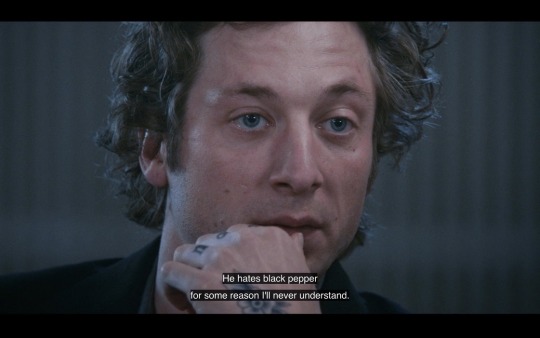
Carmen: He hates black pepper for some reason I'll never understand. (from 3x10 Forever)
White folks in Europe were so hungry for spices to liven up their food that they invaded large swathes of the rest of the world to get the stuff. And yet, here we have Chef Fields, disliking Europe's gateway spice: the one that the Romans (Carmy's ancestors) had been trading with the East for centuries prior to Europe’s imperial frenzy, and which now makes up 20% of the world's spice trade.
Is the man so dedicated to meh that he couldn’t even bring himself to embrace pepper? Used to be one of the best chefs in the world, is right Chef Luca.
On top of dubious taste (I'm not a food critic but no one can tell me that hamachi and fennel soubise dish tasted anything other than fucked lmao. idc idc), Chef Fields is also one of the clear antagonists in The Bear. Along with Donna Berzatto, he is one of Carmy's two primary abusers. His impact on Carmy was never as clear on the show as it was in season 3. Lets take a closer look at that impact below:
Culinary ancestry and intergenerational trauma
Both Donna and David are ancestors of a kind to Carmy. Donna is clearly a biological ancestor in that she's Carmy's birth mother. I've argued here that David Fields is a culinary ancestor to Carmy. For ease of reference, I'll include my explanation of what I mean when I say "culinary ancestry", from that earlier meta, here:
Most folks understand ancestry to refer to our family or genetic lineage. When I was in university, I learned about intellectual ancestors or genealogy: where one can trace your intellectual lineage - the thinkers and creators that have shaped your understanding of the world and/or your chosen profession. I think its useful to take this concept and apply it to The Bear to help understand what the show is saying about legacy. I wouldn't limit the concept to "intellectual" ancestry though. It might be more helpful to talk about culinary ancestors in this context because the process of creating food - crafting dishes - isn't solely an intellectual exercise. It engages our intellect yes, but also each of our senses, our memories (recall that chocolate banana from 2x10 The Bear), and the need to nurture and be nurtured. Culinary Ancestors Carmy's culinary ancestors are varied given his work history. We know he's cooked under some of the best chefs in the culinary world of The Bear, including: Daniel Boulud (of Daniel), René Redzepi (of NOMA), Thomas Keller (of The French Laundry), David Field (a sociopathic Joel McHale, of Eleven Madison Park Empire), and Andrea Terry (a sublime Olivia Colman, of Ever). I'd also include here Mikey, Donna and Natalie Berzatto. I'd include cousins Richie Jeremovich and Michelle Berzatto as well. These are the home and line cooks Carm grew up with, watched in his mother's kitchen and at The Beef. He took his lessons - the good and the bad, learnt voluntarily and involuntarily - from all of these people, incorporated them into his working self and transmuted them into his food.
NOTE: In "Ancestors and The Bear" and in other meta I've written, I've incorrectly noted that Chef David Fields was the EC at Eleven Madison Park (instead of Empire). This was due to the fact that up until 3x10 Forever, we are not told the name of the restaurant that Fields and Carmy worked at together. In the draft script for the pilot, the restaurant is identified as EMP (Eleven Madison Park) by Sugar (see p 23 of that script), however this appears to have changed to "Empire" during the course of the show's development.
Through the lens of culinary ancestry, there is a clear connection between Carmy's wasteful R&D and menu choices in season 3 with the "lessons" he received under the tutelage of Chef David at Empire. For example, and as discussed above, the refusal to serve any dish that isn't viewed as "perfect" led to extreme amounts of waste at both The Bear and at Empire.
Additionally, Chef David focused on "subtraction" (recall his writing "SUBTRACT" on green tape and sticking it to the expo of Empire in 3x01 Tomorrow) and never repeating ingredients in the dishes that came out of Empire. Instinctually, these two strategies appear to me to be techniques to create needless scarcity. They're attempts at repression in and of themselves. Carmy adopts these philosophies and tries to implement them at The Bear as well. They manifest in his unilaterally overhauling the original menu at The Bear (without Syd's input) as well as his insistence that the menu change every day.
Minimalistic subtraction of elements was also a characteristic of Escoffier's approach to cooking which would be taken even further with the nouvelle cuisine movement in France. That movement focused on minimalistic dishes with fewer seasonings and sauces. Chef David Fields is clearly rooted in the French school of fine dining in this approach.
Subtraction also shows up in the show in a more dire way: in the cutting off of relationships and the whittling away of self.
I recently come across a promo still for The Bear. It features Carmy as the CDC of Empire, plating a dish. I've seen the image before but I never noticed the writing on the wall next to Carmy before. It reads:
"Its only after we've lost everything we're free to do anything"
This quote also appears in the 1999 David Fincher film, Fight Club (which itself is based on the book by the same name by Chuck Palahniuk):

Left: Carmen Berzatto, CDC at Empire in The Bear; right: Tyler Durden, general nihilistic fuckwit in Fight Club, also preaching the gospel of David [Fields].
This ethos, written on the wall and haunting the kitchen at Empire is emblematic of how Chef David operates. It reads like a fucked Psalm, giving a poetic shimmer to Field's abuse. Chef David tears down his staff, verbally degrading them to the point that he has the gall to whisper "you should be dead" to them. (OK. Can we...for a minute...imagine being a manager and that being your management style? Telling your best performing staff that they should be dead? Excuse me, mon cheri? A literal devil).
Chef David literally strips his staff of their dignity and their connections to the outside world. He makes them lose their sense of self and claims its all to make them better chefs. He tells Carmen in 3x10 Forever:
Chef David: So you got rid of all the bullshit, and you concentrated, and you got focused, and you got great. You got excellent.
The parallels between Carmy's experience at Empire - and even in the Berzatto household - and the critique of performative violent masculinity that Fight Club was trying to get across are worth pointing out. In Fight Club, white men beat each other up to try and assert control over a perceived loss of power. At Empire, Chef Fields consistently berates and degrades Carmy, clearly threatened by his CDC's talent. Similarly we have Richie complaining about having to take orders from "toddler" Carmy, saying "I was a baby too once, Syd. Nobody gave a fuck" in 1x02 (which could have been the origin story of any one of the men who joined Brad Pitt/Edward Norton to carry out "Project Mayhem" lmao. In fact, I wouldn't be surprised if a lot of the dudes on Reddit fawning over Richie circa seasons 1-2 also watch Fight Club as if it was some sort of aspirational manifesto and not the satire that Fincher intended it to be).
Chef Fields is meant to be representative of a toxicity found in the restaurant industry globally. There have been numerous reports of the physical and psychological violence meted out against kitchen staff by those higher up in the brigade.
Additionally the structure of the French Brigade system is such that those at the bottom - stages - are often expected to work for free. While unpaid internships are common in various lines of work, those industries start to run into trouble when large amounts of their products and services depend on unpaid labour. In fact, darling of The Bear, René Redzepi of Noma faced criticism of his restaurant's unpaid internship program. The internship program was rife with stories of ridiculous working conditions. Redzepi finally began paying interns in 2022 but then announced that Noma would shut down regular service at the end of 2024 due to being unable to afford its staff (at one point, unpaid stages made up almost half of Noma's staff).
The fact that entry into the world of fine dining means people need to work for free as a stage automatically eliminates this as an option for folks who cannot afford to volunteer in order to gain work experience. This would disproportionately impact on certain communities, particularly communities of colour whose members may not have access to sufficient wealth that would allow them to work for free. This is clearly illustrated in The Bear where we see that Carmy has the safety nets and access in place that allow him to stage at various fine dining institutions and gain much sought after experience (e.g. his family's ownership of The Beef and his ability to work there, his cousin Michelle's restaurants in NYC and his access to those spaces). Sydney, Tina, Marcus and even Richie have very different entries into the world of restaurants and fine dining.
The issue of sexual abuse and harassment in the restaurant industry is also very subtly broached in The Bear (though it is more heavily implied in the draft script for 1x01), particularly in 1x07 The Review with Richie accusing Sydney of giving a food critic head in order to get a positive review for her risotto (season 1 Richie was genuinely the worst). But the issue is huge, with more sexual harassment claims filed in the US in the restaurant industry than any other field of work.
Even scrubbing floors by hand and cleaning with a toothbrush, while ensuring sparkling kitchens, have also historically been used as a means of punishment, particularly in institutional settings. During Australia's Royal Commission into Institutional Responses to Child Sexual Abuse, there were numerous reports of children in care homes being forced to scrub floors with toothbrushes as a means of physical punishment and control. (CW: the above link discusses accounts of institutional child sexual abuse).
Given the above, its clear to see that the industry - the system - facilitates a whole lot of shit that its workers are subjected to. So when Chef Adam Shapiro catches Sydney as she leaves the train station in 2x04 Violet and asks her how she's doing, her response is telling:
Sydney: It's been a long month [at The Bear].
Chef Adam: Ah. That bad?
Sydney: No, just-- Restaurants.
Chef Adam: Yeah. Right? Why do we do this to ourselves?
Sydney: 'Cause we're crazy.
Chef Adam: Yeah. What was this month's crazy?
Sydney: Um. The kind that's inherited.
Chef Adam: *Nods emphatically* Understood.
This Financial Times article on the dark side of restaurant culture in Copenhagen, sums things up perfectly:
“We always had this joke, an explanation for why things are so horrible: shit falls down,” [Chef Levi] Luna told [the author Imogen West-Knights], with a cold laugh. In the kitchen, the head chef gets mad at the sous-chef, who gets mad at the person below him, a chef-de-partie, who then takes it out on a stagiaire. Then one day, the sous-chef is the head chef, and he has learnt how a head chef behaves: badly. It should give a sense of the strength of feeling I encountered about how damaging this system is that several people independently described it as being like children who are abused going on to commit abuse as adults. This is the dark flipside of the restaurant-as-family metaphor.
Challenging the status quo @ The Bear
By the end of season 3, Carmy appears to recognise that subtraction in his life is not going to bring him happiness. In fact, in 1x08 Braciole, he identified subtraction - specifically, the cutting out of people from his life - as the reason his life got quiet as he grew more isolated. In 3x10 Forever, when he finally confronts Chef David, Carmy laments the psychic and physical impact of Fields' abuse as well as the isolation it engendered. Fields, psychopath that he is, remained unfazed:
Carmen: You gave me ulcers, and panic attacks, and-and nightmares. You--You know that, right? Do you-- Do you understand that?
Chef David: Yeah, I gave you confidence, and leadership, and ability. It fucking worked.
Carmen: My life stopped.
Chef David: That's the point, right?
Additionally, its worth pointing out that despite all the focus on precision, minimalism and (quite frankly) rage being put into the impeccably plated dishes of The Bear, it's the messy, juicy, multi-ingredient filled Italian beef sandwiches that remain the site's best seller. Indeed, in 3x05 Children, Nat tells Carmy that the sandwich window is the only thing at The Bear making any money. So much for subtraction.
We also see Carmy resisting a total acquiescence to Chef David's approach to running a kitchen early on in season 3. His non-negotiables read in the hindsight of the entirety of the series like his attempt at integrating the lessons he’s learned from various kitchens. It’s why the list says “no repeat ingredients” AND “vibrant collaboration”. We know that vibrant collaboration had to come from someone else’s kitchen cos Fields certainly wasn’t collaborating with anyone. That asshole was out there dictating like a fascist.
Additionally, while Carmy has realised the dangers of the fine dining industry by the end of season 3 (and not for the first time - recall in 2x01 The Beef when he called the Michelin star system "a trap"), and while Sydney grapples with her role as an "accomplice" to Carmy's season 3 bullshit, their protégés Tina and Marcus continue to keep the flame of genuine care, collaboration and inspiration alive. This is most clearly seen during the conversation Tina and Marcus have in 3x09 Apologies where they discuss Marcus' mother and his memories of her as well as brainstorm ideas for Tina's cauliflower, brussel sprouts and horseradish dish (please for the love of gad, give us more Tina, Marcus and Ebra next season).
Challenging the status quo in the real world
There are also actual chefs in the real world who appear to be doing something different with their work: embracing their own food cultures that have historically been locked out of the world of fine dining and also trying to run their kitchens in more egalitarian ways.
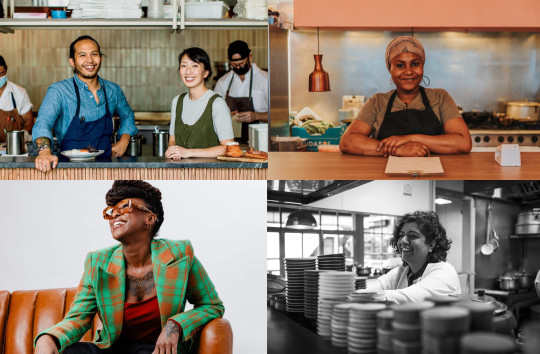
Above clockwise from top left: Chefs Tim Flores and Genie Kwon of Kasama, Chef Adejoké Bakare of Chishuru, Chef Asma Khan of Darjeeling Express and Chef Mariya Moore-Russell formerly of Kumiko and Kikkō.
The first, most obvious example of this for The Bear fans is Kasama, (shout out to @currymanganese and @thoughtfulchaos773 for introducing me to the above linked, short doco) the Filipino American restaurant founded and run by Chefs Tim Flores and Genie Kwon (who also happen to be married) in Chicago. Kasama is also where Carmy and Syd were meant to have their palate cleansing "reset" in 2x03 Sundae and where Sydney may have also been hit on by fellow Coach K fan, Kasama bae (shout out to @sydcarmyfan for verbalising what I squee-ed about on first watch of this episode lmao).
Both Flores and Kwon come from fine dining backgrounds but appear to challenge some of that industry's basic tenets, including the messianic role of the EC as top of Escoffier's brigade food chain. Flores openly states that his cooking is an ode to his Filipino mother who regularly taste tests his food. In the Nick Cavalier doco linked above, Flores states "if [his mother Lolly Flores] eats [the food] and there's no reference to her dish at all, I'm not doing the right thing." Flores and Kwon also operate Kasama using a hybrid model (that I think would send regimental Escoffier into a tailspin) where they offer fast and casual service featuring Kwon's baked goods during the day and offer a Filipino tasting menu led by Flores for dinner service only. Kasama was awarded a Michelin star in 2023, the first Filipino restaurant in the world to achieve that title. It also took home a James Beard Award that same year.
Note: if you haven't already, have a read of this interview of Tim Flores and Genie Kwon conducted by the Michelin Guide. ISTG Storer and Calo have read this and lifted whole paragraphs for The Bear's script. An excerpt that stood out to me, in particular:
The two first met at Bib Gourmand restaurant GT Fish & Oyster, also in Chicago. "He was leaving as I was starting. So we didn't overlap for very long. But I actually went to eat at the restaurant that he was working at afterwards, and I had one of the best experiences of my life at a tasting menu. And after that we started talking and hanging out, and eventually started dating," recalls Kwon about how she and Flores first met.
Sounds a lot like a couple of Jeffs we know, yes?
Also check out Chef Adejoké Bakare, who in 2024, became only the second Black woman to get a Michelin star in the world (the first being Chicagoan Mariya Moore-Russell who announced in 2020 that she was taking a break from her career for her mental and physical wellbeing and who also...is married to a chef lol). Bakare's restaurant, Chishuru in London, specialises in West African cuisine rooted in Bakare's Yoruba, Igbo and Hausa cultures. Bakare, like Genie Kwon, has a background in biological sciences. She also began her career as a home cook, then ran a fish and chip cart while studying at university in Nigeria. Once she moved to the UK, she ran a supper club and later won the opportunity to run a short term pop up restaurant. During the ceremony where she got her Michelin star, Bakare noted "[i]t did feel rather odd at last night's ceremony that 90% of the room was white middle-aged men. But the passion I see among young women in the industry is such that I'm confident things will change."
Take also Chef Asma Khan, who got her start in the industry as a home cook and then began running supper clubs out of her house in the UK. She then opened up the Darjeeling Express with a group of South Asian women she had met when they were all fairly recent arrivals in the UK, none of whom had formal culinary training. To this day, her kitchen remains fully staffed and run by women.
In this TEDx Talk about her work, Khan says:
"I wanted to cook but I actually wanted to feed people. This gave me the greatest pleasure. I felt at my most powerful when I was able to serve someone something I had cooked. In some ways it was my way of showing affection and love, and being able to give them something that took them home."
Sounds familiar yes? Like a couple of Jeffreys in season 1 of a certain show?
About the systemic sexism in the industry, Khan says:
"But at that time, in England, anywhere in the West, everywhere you looked it was male chefs you saw that was on television [...] in the media. It was always about men who were cooking kitchens. The greatest irony of it all is that [...] in every South Asian home you go to, you will invariably find a woman [cooking] but in every South Asian restaurant you go to, not just in India but in Pakistan, Bangladesh, Sri Lanka, almost everywhere in the world, you will usually find a man cooking in the kitchen. And it was a desire for me that I wanted to cook but there was no road or route in front of me."
Khan elaborates further on the skewed and gendered manner in which elite fine dining operates, in this article:
“There is no public hanging [in her restaurant]. Male chefs have made cooking into a combat sport. I think it’s a reaction to the idea that cooking is feminine: I’m not the dinner lady! I’m not your grandmother! Sorry, but if you’re constantly screaming at staff it means you’ve trained them badly.”
Khan is describing the hyper-competitive nature of fine dining (and her suspicion that in a highly gendered industry that is populated by majority men, that there is a need to perform a hypermasculinity in order to put distance between themselves and the historically feminine-gendered roots of the act of cooking) and how Khan wanted no part of it, for herself, her staff or her patrons. In this Guardian article, Khan points her attention directly at the toxic work cultures of many fine dining institutions:
Khan sees herself as a vital heckler on the sidelines of the industry, rather than part of its elite club of star chefs. She is especially scathing of a macho restaurant culture that has allowed workplace bullying and abuse to become normalised – and of those who enable it.
“My deep concern during the pandemic is seeing very prominent people with considerable wealth remove the entire workforce without a safety net.” A surge of restaurant and pub workers were reported to be sleeping rough in central London in April, a fact Khan can’t shake. “It is so shameful, my heart bleeds for the industry, it is immoral. I don’t want restaurants to be ranked by Michelin stars for the fluff and edible herbs they put on a plate. I want to know how they treat their people, they should be ranked on that. Where there is bullying and racism, where there is sexual harassment, where staff don’t feel safe, people should boycott those restaurants. I don’t want to see them prosper.”
Honestly, after reading some of the horror stories about work place practices in the restaurant industry, I'm with Khan. I'm also with Flores, Kwon, Bakare and Moore-Russell. I reckon Storer and Calo are also with these folks too and that we're going to see a shift in season 4 of The Bear that reflects the larger industrial change in the world of fine dining that chefs like these are heralding.
The death of fine dining
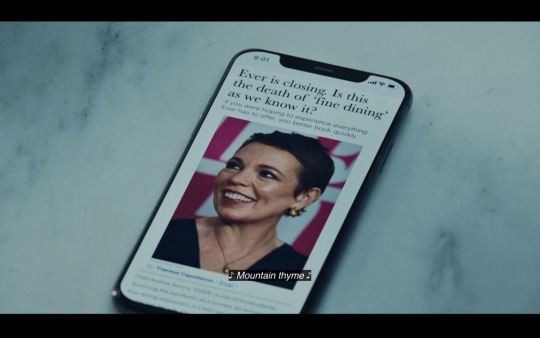
Above: Carmy's phone in 3x05 Children
Like @freedelusionshere says here, I don't think its a suprise that season 3 ended with Ever's funeral. The fine dining of Empire and even Ever is dead. How can it not be given the way its been largely running to date, as discussed above? How can it not be when we are living in a time of severe food insecurity precipitated by runaway consumerism and the twin existential threats of global climate and extinction crises. How can anyone in good conscience justify charging exorbitant amounts of money on a plate that is not going to fill patron's bellies while there are communities worldwide who do not have enough food to feed their children? When some communities, even in so-called "first world" countries like America and Australia cannot access clean drinking water?
Truly, the argument for fine dining posited by Will Guidara in 3x10 Forever made me (and I'm sure many others) actually cringe.
There's nobility in this. [...] We can give them the grace, if only for a few hours, to forget about their most difficult moments. Like, we can make the world a nicer place. All of us in this room. We have this opportunity, perhaps even a responsibility, to create our own little magical worlds in a world that is increasingly in need of a little more magic.
There *is* nobility in nurturing people, in feeding them. But in a time of the multiple and rolling, global existential crises, where particular communities are being targeted not just for marginalisation but whole scale eradication, this is not a time for more "magic"; particularly when those "little magical worlds" are reserved for the select few who can afford them. We don't need more holes to bury our heads in. We need real spaces of care that are accessible, kind (read: not nice, but kind. there is a big difference) and nurturing. And those spaces need to be those things not just for the patrons who visit them but also for the staff who work there.
There is also literally no time for escapism, at least not of the kind that late stage capitalism promotes and as described by Guidara in 3x10. We are living at a time where food systems are said to make up one third of all greenhouse gas emissions, pushing the climate crisis further to the point of no return. What's the point of making magic worlds to escape an actual world on the brink? And while your magic-making contributes to the brink getting closer? Its like putting lipstick on a pig.
Indeed some have posited that it was the British Empire's remaking of the world to feed Britain (which we've looked at briefly above) that has been the single biggest contributor to the current environmental crises facing our planet. The Bear acknowledges the issue as well. Recall 2x04 Violet when Tina visits Jerry at the farmers' market and his explanation for why he has so little produce to sell:
Jerry: There's fewer and fewer moths to grow vegetables now, and 'cause of that, there's fewer and fewer farms. Used to be you could come down here, buy everything you needed for a full menu. All in one spot. Whatever grows together, goes together.
The reason there are fewer months to grow vegetables is because of climate change which has impacted on everything to season length, groundwater and rainfall levels (as the two main sources for global farming irrigation) and increased periods of drought and heatwave.
So whats next for The Bear?
Season 3 put us through the ringer with Carmy replicating toxic practices in his restaurant that are rife in the industry at large. Yes, Carmy also has mental health issues and is a survivor of multiple sources of trauma. We know this. I've talked about this at length here and here. But he's also a guy who's running his own business with folks who are dependent on their place of work for their livelihoods. As such, he, Nat and Uncle Jimmy (as co-owners of The Bear) have responsibilities to their staff.
As EC at The Bear who is directly responsible for managing BOH, Carmy has a choice to make about whether he "blows his trauma through" (shout out to Dr Resmaa Menakem and his book My Grandmother's Hands) the bodies of those closest to him, including the crew at The Bear. Just as parents have to work on themselves so that they don't replicate harmful patterns of behaviour in raising their children, so too do we all in our daily relationships, including where many of us adults spend most of our waking lives: at work.
Like Richie observed, Carmy is not integrated in season 3 but neither is the industry in which he's working. A menu that constantly changes, wasteful food practices, a food production and agricultural industry that contributes to a third of global greenhouse gas emissions leading to increased global warming. These things are absolutely not integrated. In many ways, Carmy's mental state in season 3 - anxious, agitated, exhausted, is a reflection of the times. Given all of the above, Carmy's "I'm so fucking sick of this" in 3x09 Apologies hits me harder in the chest. Yes Carmy, you should be. Now go do something about it.
Having looked at the career trajectories of a few talented, conscientious chefs in the course of writing this meta, I think its pretty clear that the old way of running restaurants a la Chef David Fields is over. As we sit at the precipice of climate disaster, watching multiple genocides unfolding at once, during a time of massive food insecurity, who the hell has time to be suffering in the way Chef David made his employees feel in the course of making food that is meant to nourish people? What fucking cognitive dissonance is required to continue on THAT kind of a path?
Come season 4, I reckon we are going to see a massive shift in the trajectory of The Bear. This will be precipitated by multiple things (like the review Carmy got at the end of 3x10 and whatever the fuck Uncle Jimmy is up to with that box and those golf clubs lol) but most significantly, by a realisation on Carmy's part that his version of Michelin mode IS NOT IT.
I reckon Carmy and Sydney are going to continue to work together but they'll go back to the original plan they made with one another in 1x08 Braciole. They're going to go back to family style. They're going to treat their staff better (after Carmy apologises lol). They're going to shift from wasteful, haute cuisine to sustainable food practices that support producers and the planet more broadly. They're going to leave Chef David Fields' scare tactic of subtraction behind and lean into using more pepper.

Above: Sydney's notebook as she workshops a recipe at home in 1x08 Braciole.
Tagging: @moodyeucalyptus @currymanganese @hwere @freedelusionshere @thoughtfulchaos773 @ambeauty @brokenwinebox @devisrina @espumado @fresaton @kdbleu @vacationship @birdiebats @bootlegramdomneess @mitocamdria @tvfantic87 @angelica4equity @anxietycroissant @turbulenthandholding @yannaryartside @afrofairysblog @ciaomarie
cos you may be interested but as always, I'd love to chat to whoever wants to about this stuff!
#my next meta will not be nearly as long as this...i hope.#this one took months lmao#just in time for the end of#sydcarmyweek2024#sydcarmy week 2024#the bear#the bear fx#the bear hulu#the bear meta#sydcarmy#carmen berzatto#sydney adamu#the bear season 3#mariya russell#asma khan#kasama#adejoke bakare#genie kwon#tim flores#chishuru#darjeeling express#good luck at the emmys bear crew!
123 notes
·
View notes
Note
I agree schools should use other books along with Mockingbird to explore past racism from Black perspectives, and the title that immediately came to mind was The Bluest Eye; but then I remembered Toni Morrison's afterword in the re-release, where she talked about wanting to truly open nonblack readers' eyes to the plight of dark-skinned Black women in America when she wrote the book, but felt she'd only succeeded at facilitating those readers' prurience. What's your opinion?
You said you mean *voyeurism, but it made me look up prurience, which VERY WELL could have also been a reaction to the story from certain viewership. The book I'm reading now has discussed the morbid sexual desire that white men in particular had for Black bodies and the possession and submission of them.
Anyway. I agree with her.
Think of it like this. Squid Games 1 & 2 are excellently written reflections of capitalism and the layers of its damage. It's horrifying, watching people die for the chance to live. And yet there are Domino's commercials showing people delivering pizzas during the death games.
So it's one of those disappointing things where the depth and importance of the message is delivered by the creator, but the consumers really only want to see what titillates them, what causes a reaction.
Thinking about their role in the society that created a story like The Bluest Eye (which, Hot Chocolate has read. I haven't. I tend to prefer nonfiction as an adult, but I need to get on that) would be far harder, more upsetting and discomforting to the average white reader than simply enjoying it on its surface. It's why they don't want it in schools; they claim it's "too sexual" but we know that's not it. So in the end, they just get to watch our deep suffering- suffering I'm sure was hard to write- and enjoy it as theatre without really walking away with anything.
65 notes
·
View notes